Spring 2022 Course Announcements
Go to the Spring 2022 Course Schedule page to see the schedule for all Spring 2022 courses.
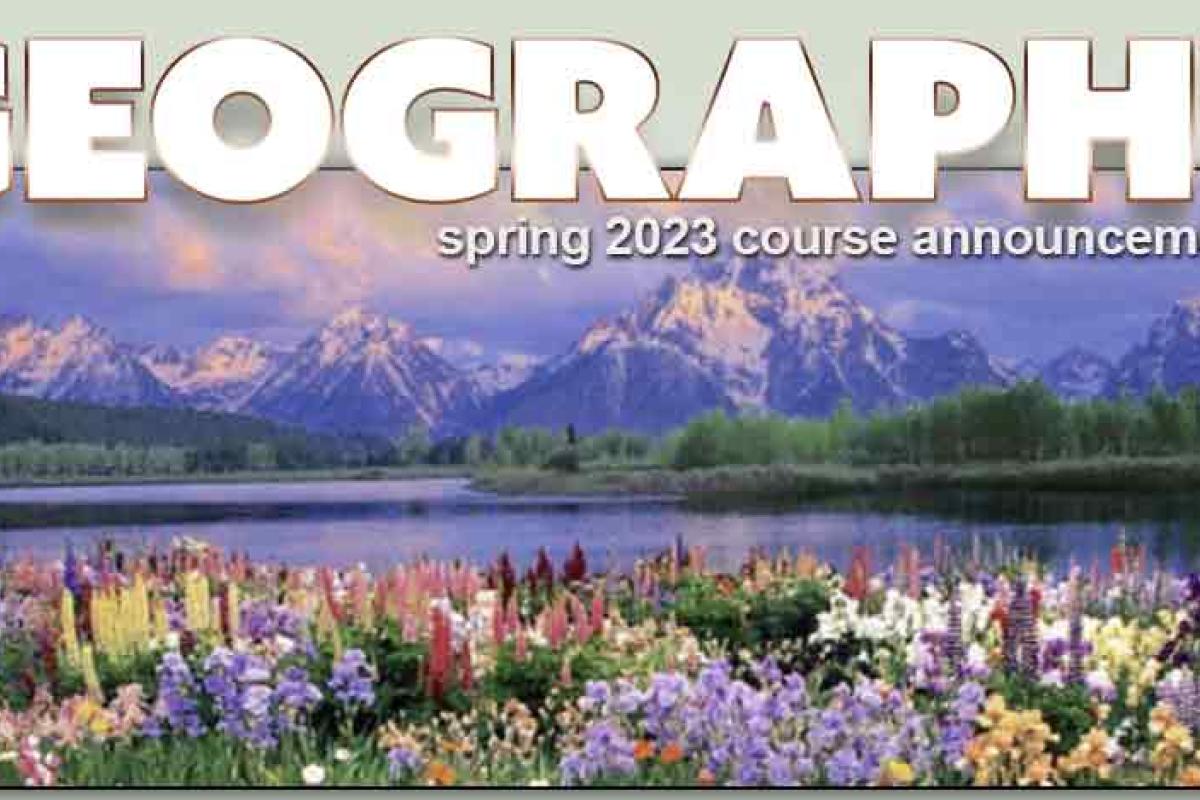
GEOG 1001
Environmental Systems: Climate and Vegetation
Section 010: Rachel Isaacs
Section 581*: Steve Welter
The objective of this course is to provide you with an introduction to the Earth's climate system and patterns of world vegetation. We will emphasize the many linkages and feedbacks between the non-living (abiotic) and living (biotic) components of the earth system.
Topics we will cover include radiation, temperature, winds and pressure, the water cycle, climate change, and biomes. This course will prepare you for subsequent, more specialized courses in climatology, hydrology, ecology, and biogeography (ecosystems and cycles). This is a natural science course, and graphs and basic algebra-level math calculations will be used to help understand the concepts covered.
*Continuing Education (CE) Classes are Billed Separately. If you enroll in both Main Campus and CE classes in the same term, CE tuition will be billed in addition to your Main Campus tuition. This class is not COF eligible.

GEOG 1011
Environmental Systems: Landscapes and Water
Section 010: Melisa Diaz
Section 581*: Steve Welter
Earth’s landscapes – the natural surfaces composed of rock, soils, water and vegetation – are always changing. These landscapes host life and human activity. Knowledge of how the Earth’s surface changes is necessary to ensure public safety, provide food and water security, and support ecosystem management – and thus this knowledge is relevant to diverse career pursuits.
Topics covered include the basic geologic processes of plate tectonics, volcanoes, and earthquake. We then explore how the land surface is shaped by water and physical processes, focusing on weathering, soils, hydrology, fluvial processes, glaciers, climate change, and human impacts. By the end of the course, you will be familiar with the primary physical processes involved in the formation of the Earth’s landscapes. You should also be able to generally describe how these natural sciences are related to important scientific and societal issues.
*Continuing Education (CE) Classes are Billed Separately. If you enroll in both Main Campus and CE classes in the same term, CE tuition will be billed in addition to your Main Campus tuition. This class is not COF eligible.
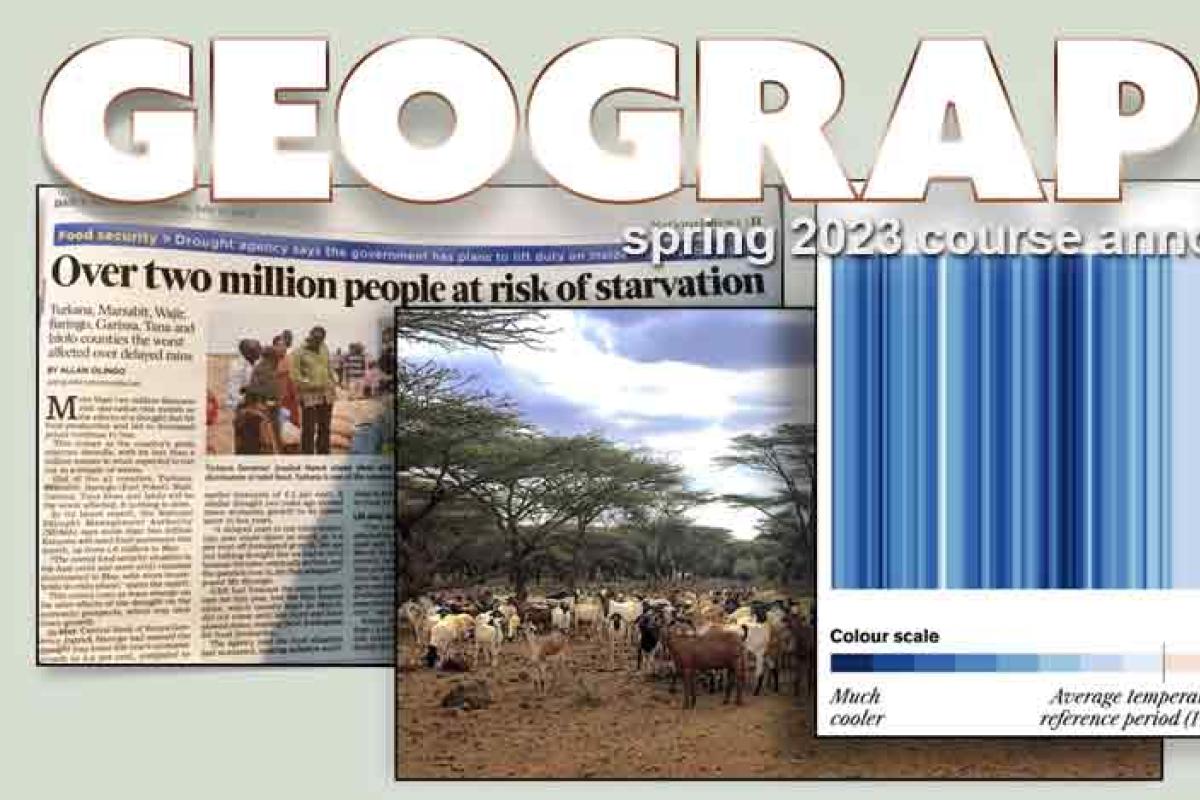
GEOG 1962
Geographies of Global Change
Section 100: John O'Loughlin, Bill Travis, Jennifer Fluri
Section 581*: Diego Melo
The course focuses on contemporary issues of the relationship pf people to their natural environment. The class has three modules. Module 1 reviews the main consequences for humans of climate change, especially migration, food insecurity and resource scarcities with a focus on Africa. Module 2 examines the interaction of people and nature via the persistent patters of the natural and technological disasters in rich and poor countries. Module 3 examines the power dynamics of gender, race, and class as part of environment and development processes involving climate change and environmental justice.
The class is team-taught by three professors who are expert in the respective topics ad serves as an introduction to geographic perspectives on matter of contemporary global importance and that involve difficult personal and political choices.
This class fulfills a MAPS requirement and a requirement for the Geography Major.
*Continuing Education (CE) Classes are Billed Separately. If you enroll in both Main Campus and CE classes in the same term, CE tuition will be billed in addition to your Main Campus tuition. This class is not COF eligible..
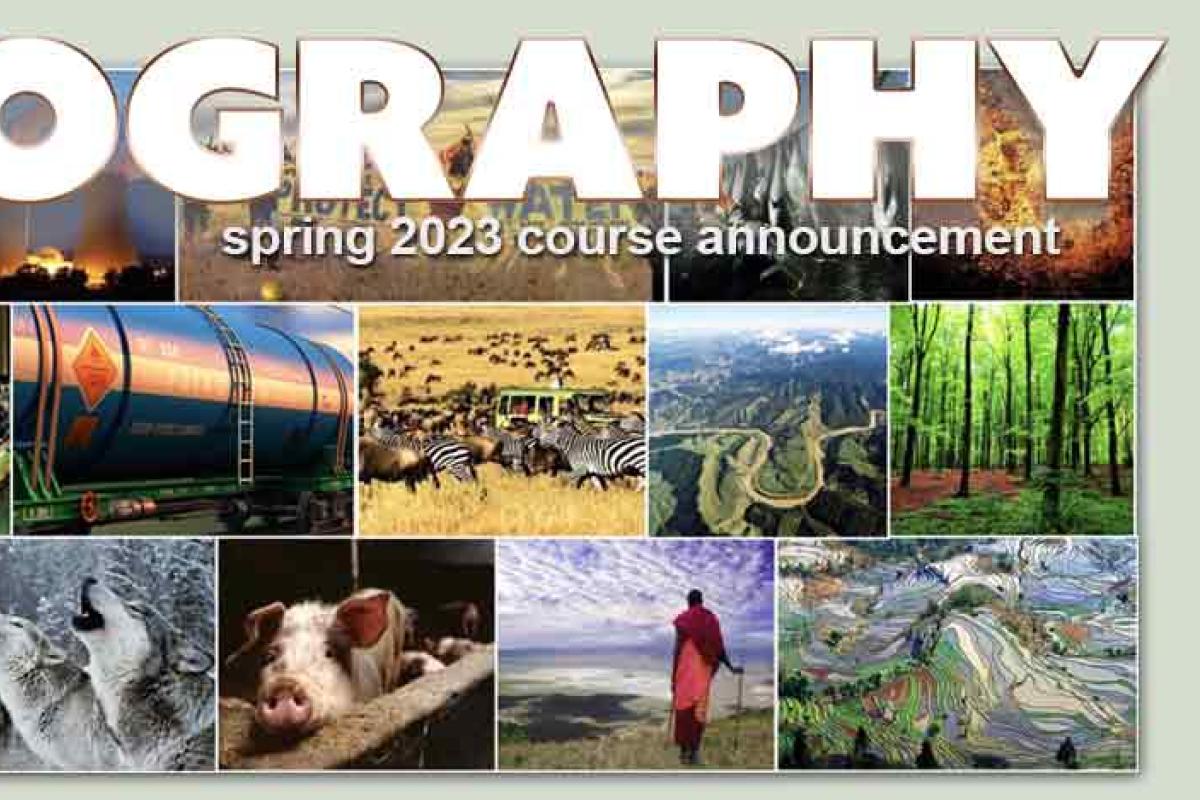
GEOG 1972 - 581*
Environment-Society Geography
Phurwa Gurung
The study of global environmental issues evokes one of the most profound questions of our times: What is, and what ought to be, the relationship between humans and the environment? To answer this, we must also ask: What is “nature” and how do people of different cultures conceptualize it differently? What drives human modification of the earth and its non-human inhabitants, and how are specific groups of people differentially affected by these modifications? What kinds of assumptions have led to the creation of certain environmental problems, and for whom or what are they problems? Topics we will cover include anthropogenic climate change; population and consumption; hazards, ethics, and environmental justice; conservation; wolves; trees/deforestation; food/agriculture, water, and waste. We will draw from examples around the world to critically examine how environmental problems are defined and tackled and what this tells us about nature-society relations more broadly.
This class fulfills a MAPS requirement and a requirement for the Geography Major; it is also a great introduction to “Environment-Society” Geography Track.
*Continuing Education (CE) Classes are Billed Separately. If you enroll in both Main Campus and CE classes in the same term, CE tuition will be billed in addition to your Main Campus tuition. This class is not COF eligible..
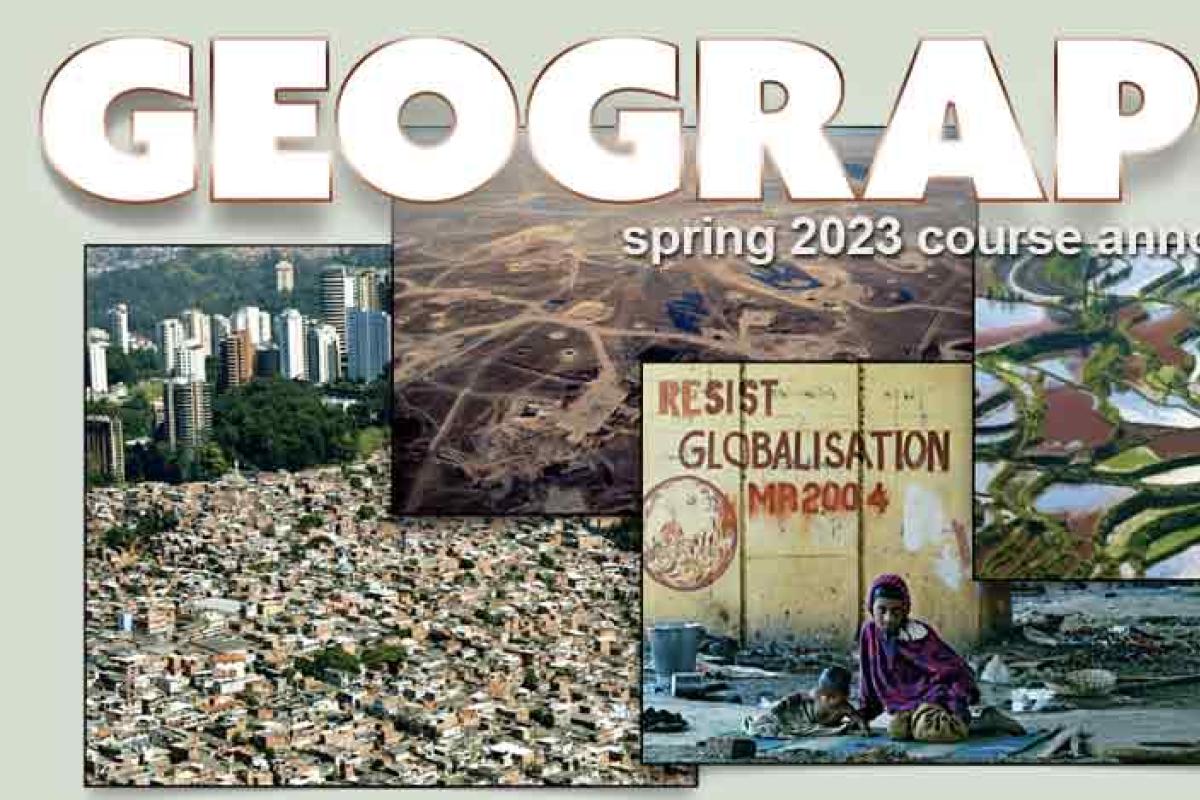
GEOG 1982
Global Geographies: Societies, Places, Connections
This course introduces a comparative and critical framework for understanding world regions. We will examine different regions by looking at their history, geography, and discussing current problems and challenges they face. This includes helping students understand the complexity and interconnectedness of issues such as development, economic growth, income and wealth inequality, colonialism and neocolonialism, political conflict, population, race, and climate change — all in the context of globalization.
Examples and assignments will link course topics to current events and students' own experiences.
This class fulfills a MAPS requirement and a requirement for the Geography Major.
*Continuing Education (CE) Classes are Billed Separately. If you enroll in both Main Campus and CE classes in the same term, CE tuition will be billed in addition to your Main Campus tuition. This class is not COF eligible..
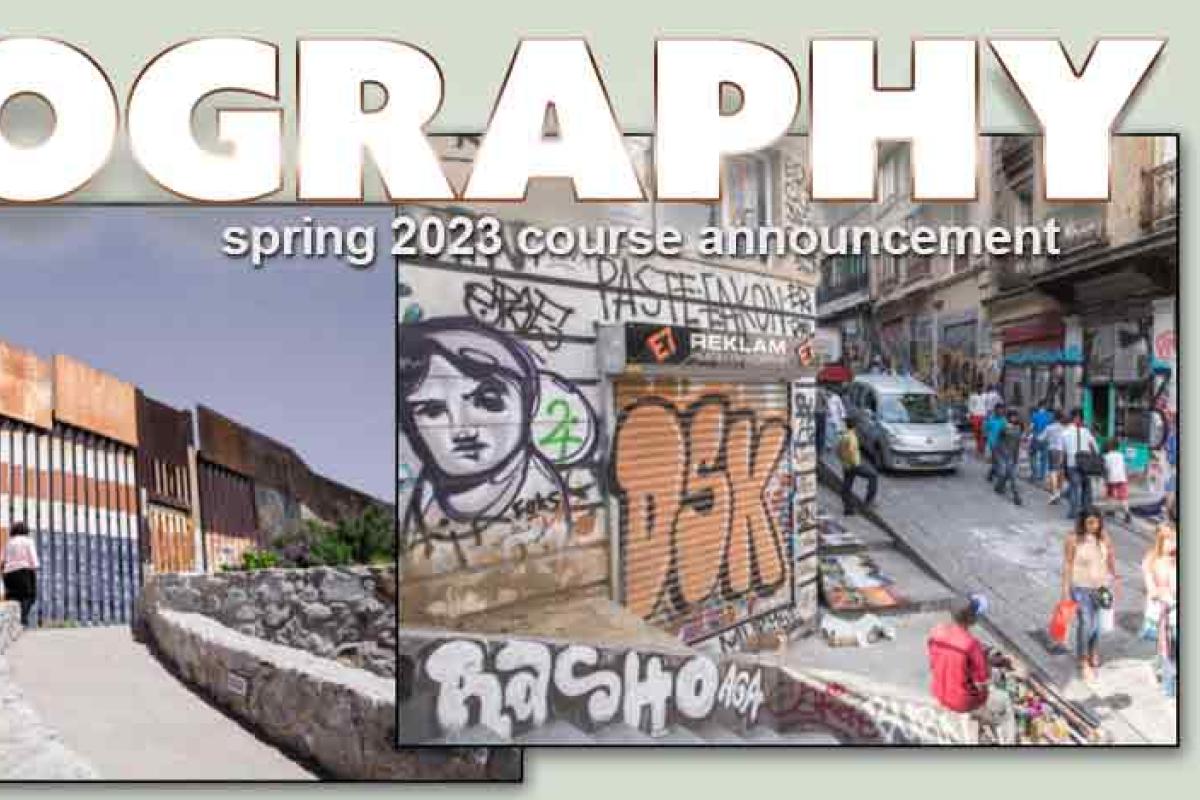
GEOG 1992-581*
Human Geographies
Caitlin Ryan
Examines social, political, economic, and cultural processes creating the geographical worlds in which we live, and how these spatial relationships shape our everyday lives. Studies critical geopolitics, ecological change, international development, population dynamics, urbanization, and migration to explore how these processes work at global scales as well as shape geographies of particular places.
This class fulfills a MAPS requirement and a requirement for the Geography Major; it is also a great introduction to the "Human Geography" Track.
*Continuing Education (CE) Classes are Billed Separately. If you enroll in both Main Campus and CE classes in the same term, CE tuition will be billed in addition to your Main Campus tuition. This class is not COF eligible..
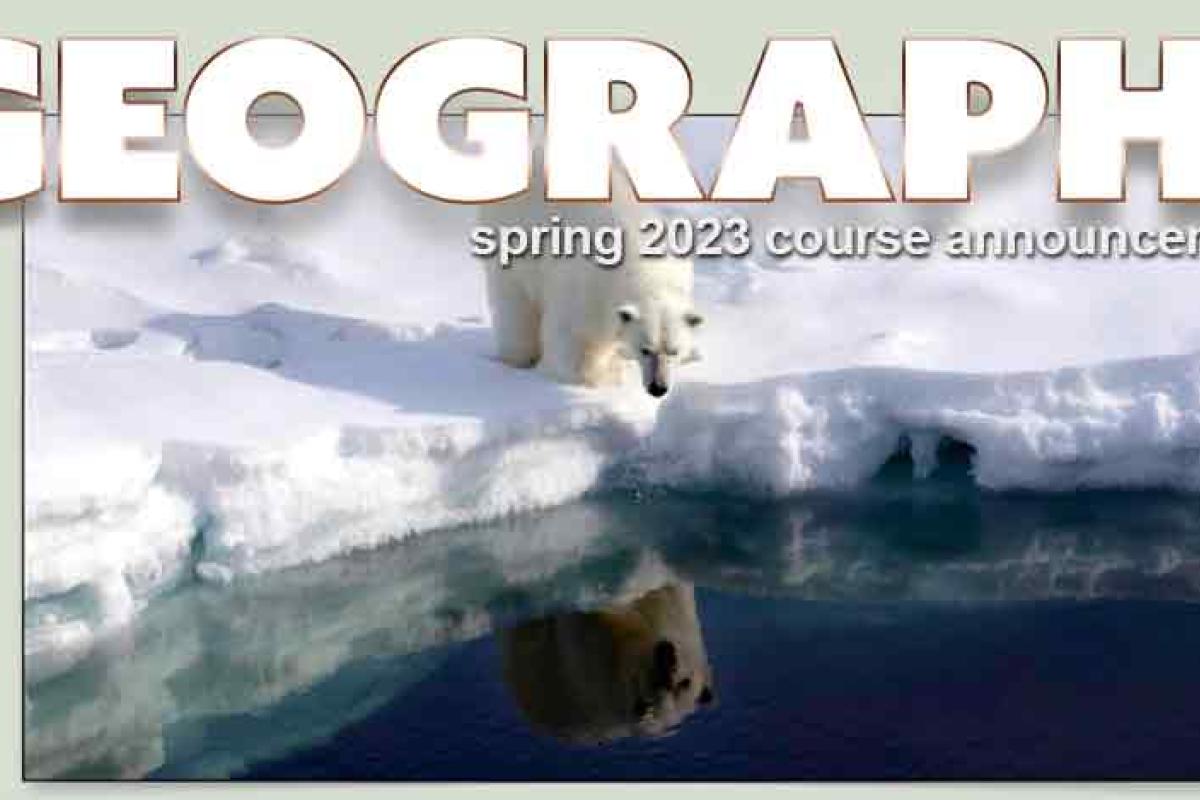
GEOG 2271-581*
Introduction to the Arctic Environment
Steve Welter
The Arctic plays a key role in the global climate system and is a region in the midst of rapid change, encompassing the land, ocean and the atmosphere. In this course you will learn about the highly varied climates and landscapes that characterize the Arctic, the Arctic Ocean and its floating sea ice cover, the Greenland ice sheet, Arctic tundra, snow and permafrost. The course will also emphasize the dramatic changes that are taking place in the Arctic, including rapid warming and a shrinking sea ice cover, and what these changes mean for the rest of the planet.
*Continuing Education (CE) Classes are Billed Separately. If you enroll in both Main Campus and CE classes in the same term, CE tuition will be billed in addition to your Main Campus tuition. This class is not COF eligible..
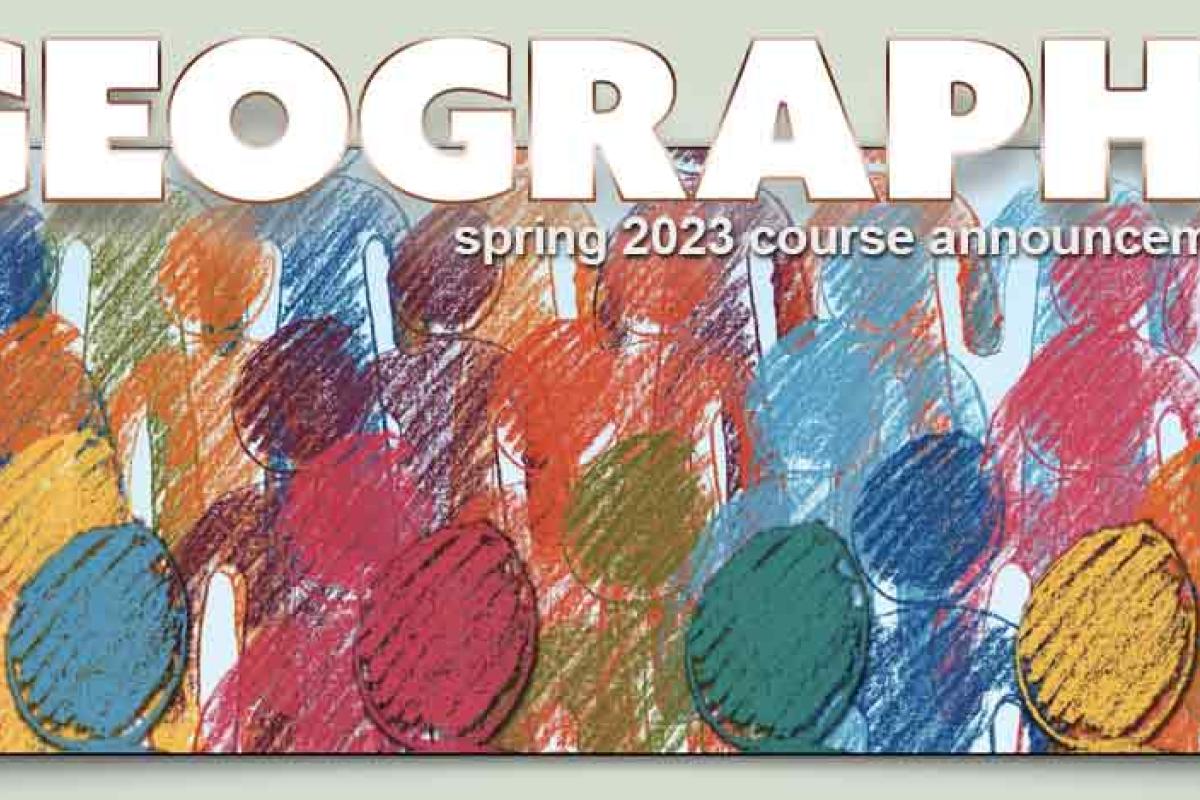
GEOG/IPHY 2692
Foundations in Public Health
Maureen Floriano
This course provides a comprehensive overview of public health as well as an in-depth review of specific public health-related topics. Beginning with historical overview, students will explore major public health concepts such as the basic principles of epidemiology, the biomedical basis of disease, social and behavioral determinants of health, and systems thinking. Students will be introduced to the concepts of measuring and evaluating the health of the populations, principles of communicable and non-communicable diseases, environmental and occupational health, the economics of health, and the role of public health workers in society.
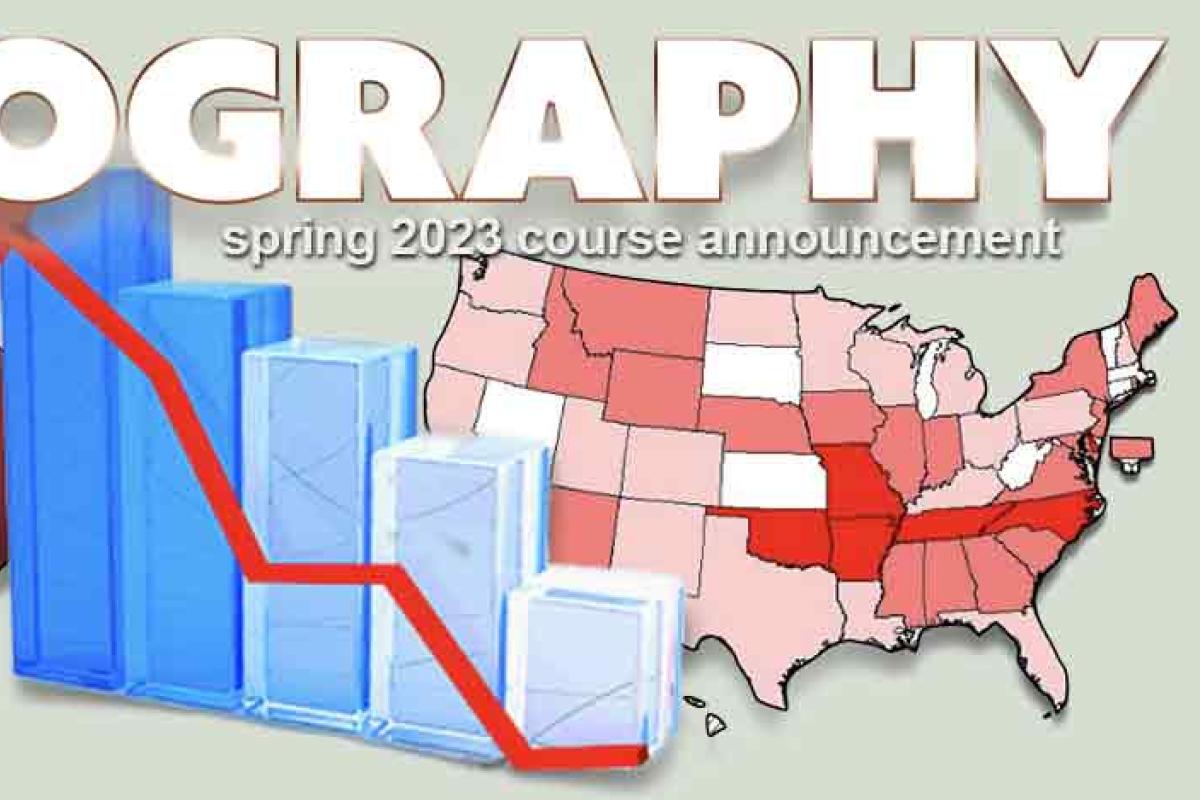
GEOG 3023
Statistics and Geographic Data
Section 010: Morteza Karimzadeh
Section 581*: Teresa Chapman
From fitness trackers to Facebook to polls on politics and other issues, our world is flooded with data. Careers in Data Science are in high demand, and technological and societal changes make data available on nearly everything.
In this course, we teach you how to understand and model the relationships between data and your world. You'll learn how to collect data, learn modeling techniques, and develop questions that we can answer with statistical methods. The course is hands-on and will guide you in using the latest statistical software to produce graphics, answer questions, and find patterns about the world around us.
This course does not assume any previous experience with statistics. It satisfies the statistics requirement for the Geography major, and serves as a great introduction to data modeling for any Geography major or minor.
*Continuing Education (CE) Classes are Billed Separately. If you enroll in both Main Campus and CE classes in the same term, CE tuition will be billed in addition to your Main Campus tuition. This class is not COF eligible..
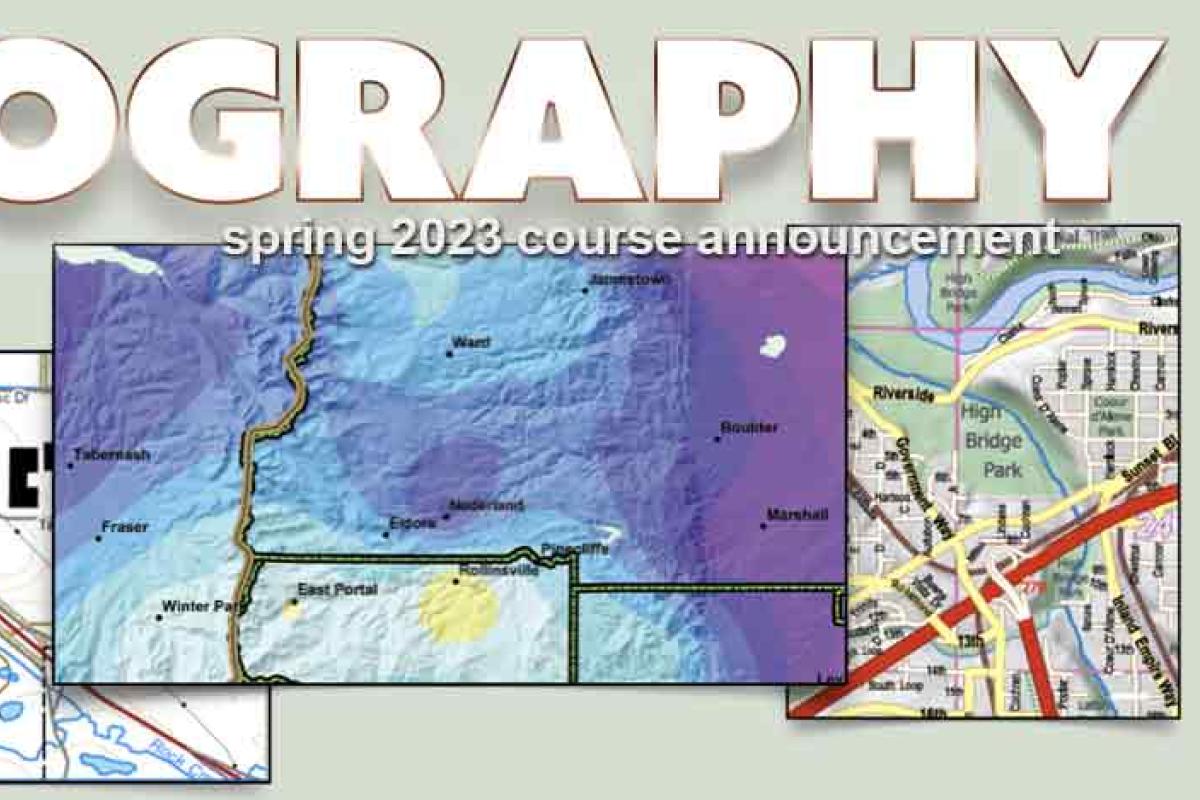
GEOG 3053
Geographic Information Science: Mapping
Sarah Kelly
Mapping and data visualization supports many tasks in Geography, Environmental Studies, Earth Sciences and Human and Social Sciences. Maps can help you explore spatial data, perform analysis, and present meaningful results. Knowing how to put together a database and process layers of terrain, water, roads, and thematic data (vegetation, population, etc.) in order to make a map is an extremely useful skill that many employers are seeking. Come learn what it is all about!
This course provides a technical introduction to mapping and information design in a GIS environment. We'll cover principles of scientific visualization, graphical design, and mapping. You'll learn how to manipulate scale, work with and change map projections, how to select informative colors, how to classify map data, and how to symbolize data, and how to quantify patterns of error on maps. In lab, you will design maps and create a working cartographic database. By the end of this course, you will be capable of creating high quality cartographic displays and work comfortably with Desktop ArcGIS software to process spatial data.
Some prior experience with Apple or Windows computing is expected. No previous experience in ArcGIS or mapping technologies is required. GEOG 3053 is a prerequisite for the Geography GIS courses. A beginning course in statistics is strongly recommended and may be taken concurrently.
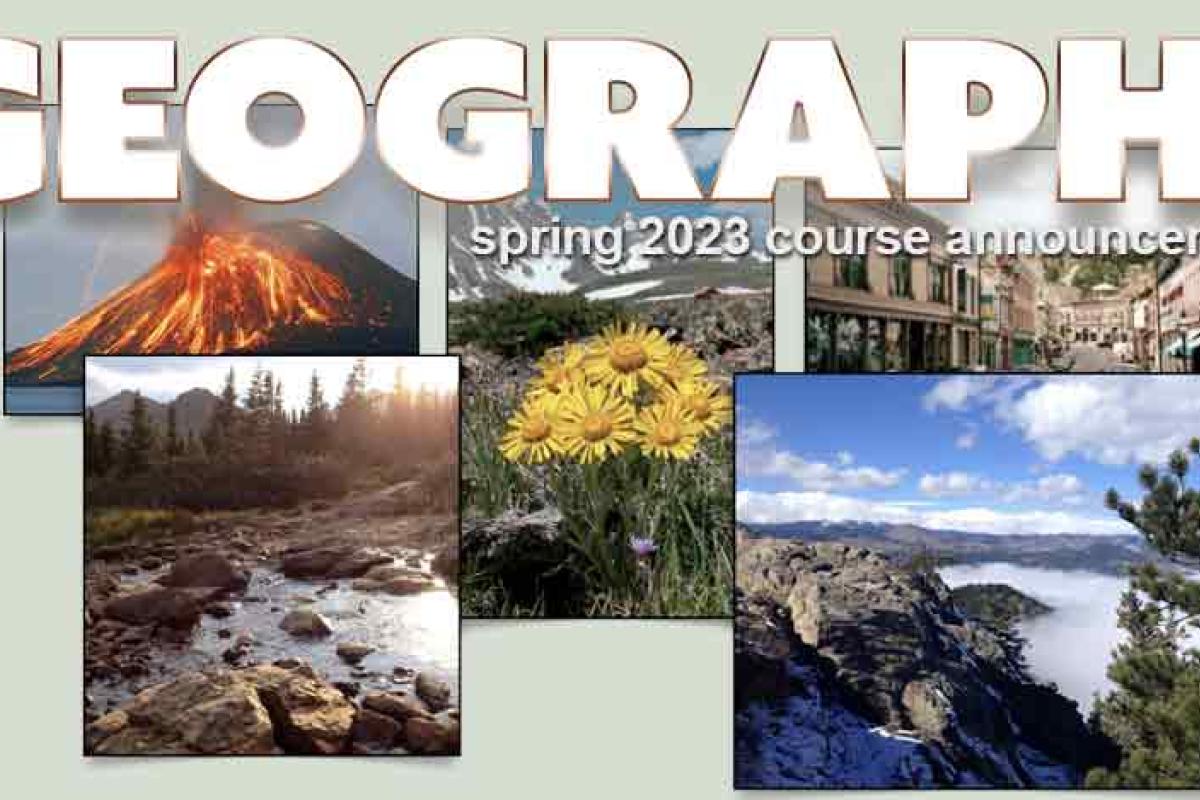
GEOG 3251-581* & 582*
Mountain Geography
Sam Smith
The world’s mountains are fascinating and mysterious landscapes. Created by geologic activity, shaped by water and ice, and transformed by vegetation and human activity, mountain landscapes offer a unique perspective into historical and current events. Using mountain landscapes as our study area, this course will examine the interactions and connections among key topics in physical and human geography. Daily presentations and frequent hands-on activities will apply geographic concepts to the Colorado Rockies as well as mountain ranges around the world. To explore our mountain landscapes, local examples will be used to examine how wildfire impacts local forests and human communities, and investigate how historic mining and continuing human activities have shaped the mountain landscapes in our backyard.
*Continuing Education (CE) Classes are Billed Separately. If you enroll in both Main Campus and CE classes in the same term, CE tuition will be billed in addition to your Main Campus tuition. This class is not COF eligible..
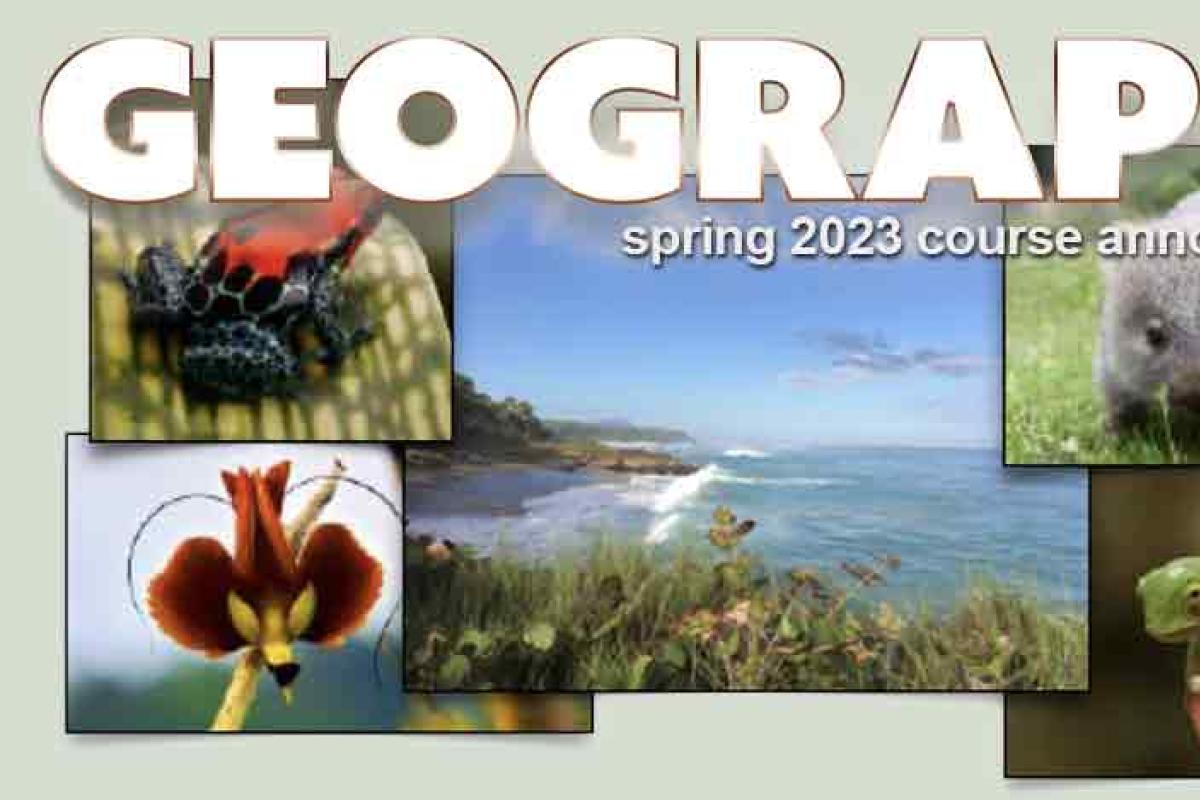
GEOG 3351
Biogeography
Rachel Isaacs
“Biodiversity is the totality of all inherited variation in the life forms of Earth, of which we are one species. We study and save it to our great benefit. We ignore and degrade it to our great peril.” -- E.O. Wilson
Learn about the evolution and ecology of plants and animals across the globe! Biogeography examines the geography of biological life by employing an interdisciplinary framework. During the course we will delve into the mysteries of endemism and speciation across space and time, covering basic concepts and principles of geographic variation and evolution. This is a student-centric course utilizing a range of learning experiences and instructional approaches. It is a fantastic complement to all upper-level GEOG, ENVS, and EBIO coursework.

GEOG 3402
Natural Hazards
Section 100: Bill Travis
Sections *581 & *582: David Bachrach
This class examines the interaction of society and natural extremes, with particular attention to exposure, vulnerability, preparedness, mitigation, and recovery from natural disasters. Our social science approach differentiates this class from courses on natural disasters taught as natural science, where the emphasis is on the physical processes (like tectonics and volcanism). We treat the subject as both an academic field of inquiry that provides insight into social structures, human behavior, and environment and society relationships, and as a professional field in which students learn methods and skills that can be applied to careers in environmental and hazards management. While we will briefly cover the physical science of hazards like hurricanes, floods, and earthquakes, the focus is on human geography: how people and institutions perceive and respond to hazards and how development in hazardous areas increases risk. Given the time, we will also briefly examine technological hazards and disasters.
This is a lecture class, with exercises and exams. The material is in four main categories: (1) concepts and principles, including material on the nature of extreme events, social exposure and vulnerability, trends in hazard impacts, and ways to measure and characterize hazards and risks; (2) specific hazards like hurricanes, floods and earthquakes; (3) hazard impact reduction, including mitigation, warning systems; land use; insurance; and recovery; and (4) special topics such as events in the news.
*Continuing Education (CE) Classes are Billed Separately. If you enroll in both Main Campus and CE classes in the same term, CE tuition will be billed in addition to your Main Campus tuition. This class is not COF eligible..
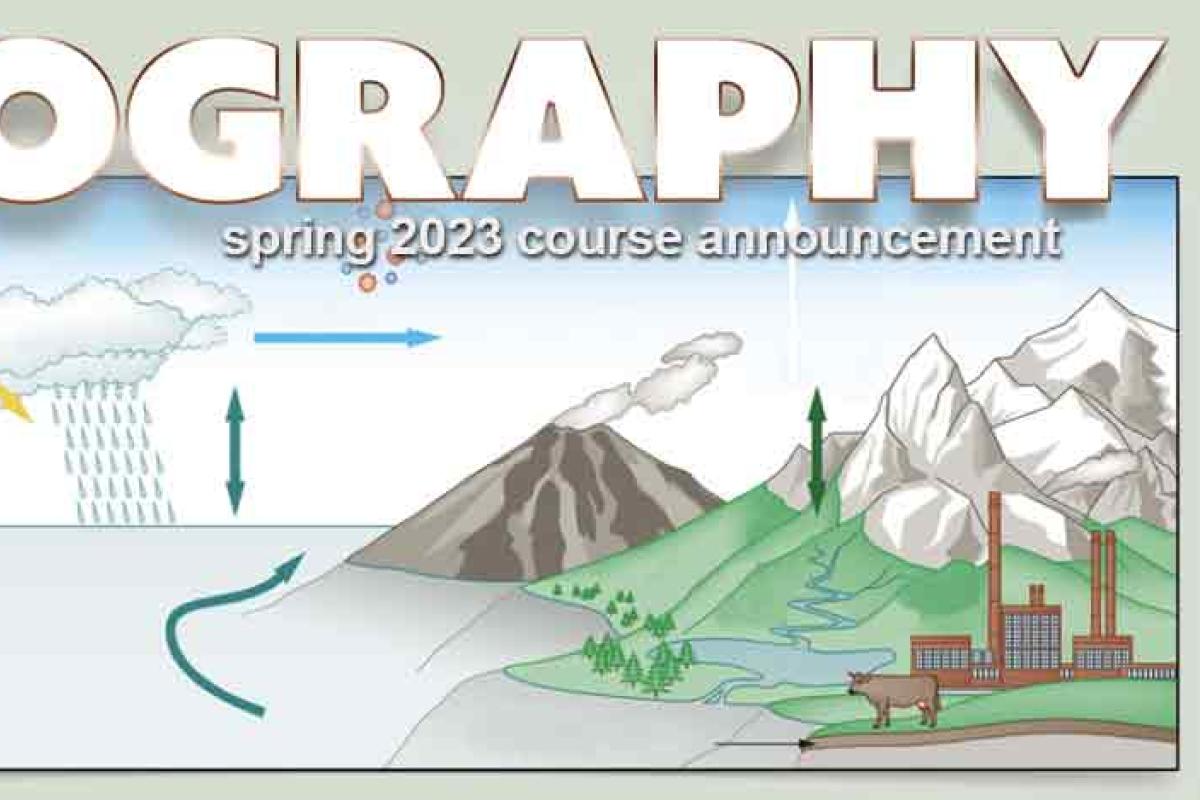
GEOG 3601 / ATOC 3600 / ENVS 3600
Principles of Climate
Peter Blanken
This course describes the basic components of the climate system: the atmosphere, ocean, cryosphere, and lithosphere. We will investigate the basic physical processes that determine climate and the link between the components of the climate system. Emphasis is placed on the hydrologic cycle and its role in climate, climate stability, and global change. The theme throughout this course will be an examination of the importance of climate as one of the major forcing functions in environmental change. Both human-induced and natural climate variability will be covered.
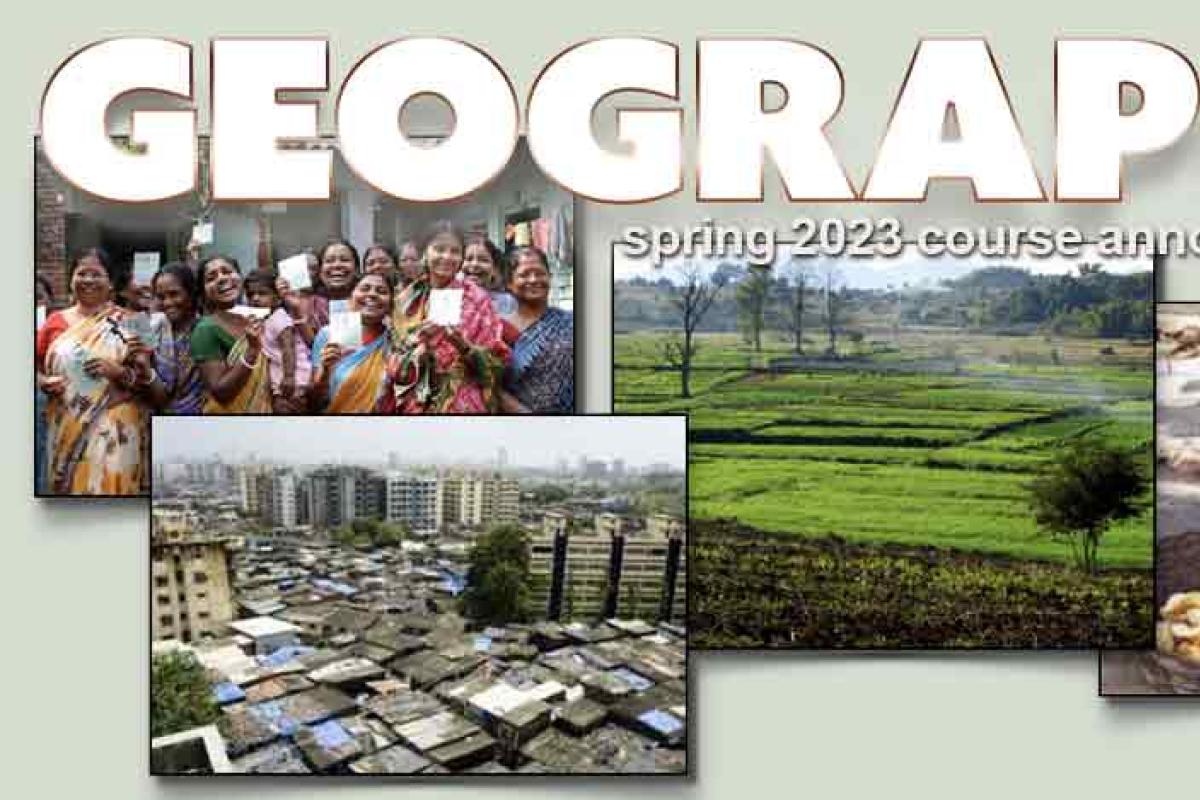
GEOG 3682 - 581* & 582*
Geography of International Development
Caitlin Ryan
Today, amid rising global debates about migration, regional instabilities from the Mediterranean to the South China Sea, and transnational corporations increasingly involved in everything from poverty to governance to climate change, the politics of international development could not be more urgent.
What is the role of international assistance in a world marked by imperialism and inequity? How do actors in the “global South” deal with livelihood and governance issues that crosscut economics, politics, history and tradition? How is “Development” itself changing as the United States place in the world is increasingly unsettled?
This course uses the lens and tools of human geography to explore these questions. Examining cases from Latin America, sub-Saharan Africa, South Asia, the Middle East and the Pacific Rim, this course surveys the changing terrain of international development at the dawn of the Twenty-first Century.
*Continuing Education (CE) Classes are Billed Separately. If you enroll in both Main Campus and CE classes in the same term, CE tuition will be billed in addition to your Main Campus tuition. This class is not COF eligible.
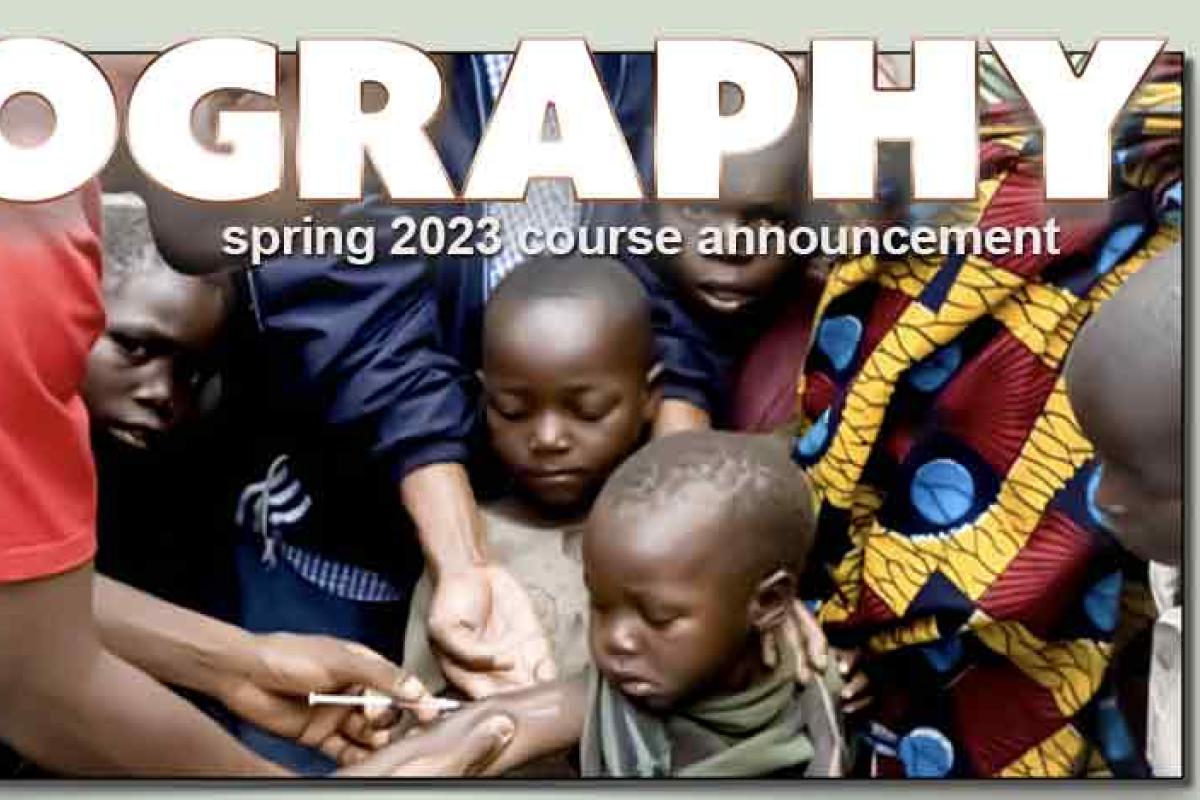
GEOG 3692
Introduction to Global Public Health
Section 100: Colleen Reid
Section *581 & 582*: Caitlin Ryan
This course explores critical issues in global public health through a biosocial lens, incorporating the biological, economic, political, social and cultural influences on health. We take a candid look at the challenges of quantifying health as well as the issues of past health and development initiatives (with a focus on developing countries). We examine the tensions between intellectual property rights and the fundamental need for affordable medicines as played out in the cases of TB and HIV. We delve into the roles of the World Health Organization, nongovernmental organizations and ministries of health in addressing both infectious and non‐ communicable diseases. We explore health care systems and consider the essential elements of systems which improve accessibility and quality of care for its citizens. We look at the future priorities of global health, including the impact of climate change on health. Students will read and discuss case studies on global health, conduct a guided semester-long research project on the health of a developing country, and take 3 non- cumulative exams. This is a 4-credit course.
*Continuing Education (CE) Classes are Billed Separately. If you enroll in both Main Campus and CE classes in the same term, CE tuition will be billed in addition to your Main Campus tuition. This class is not COF eligible.
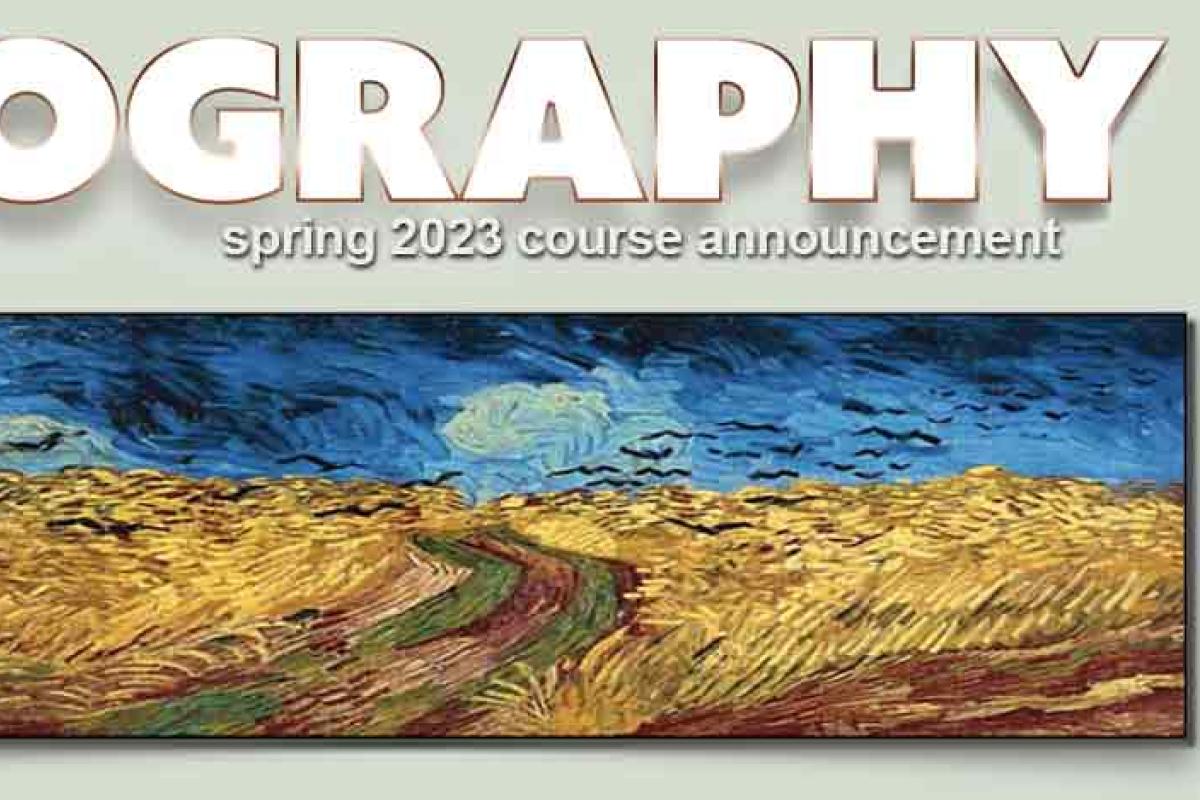
GEOG 3742 - 581*
Place, Power and Contemporary Culture
Shruthi Jagadeesh
What is 'power,' and how are spaces produced through relationships of power? GEOG 3742 introduces students to key theories and contemporary debates in critical and feminist geography through a focus on the themes of power, space, and culture as conceptual frameworks. We will apply critical geographic perspectives on power to the topics of: colonialism and imperialism; states and territoriality; transnational migration and human rights; conflict and nationalism; environmental politics and social movements; and connections between local and transnational activism.
The course is structured around four units:
i) feminist geographies;
ii) postcolonial geographies;
iii) environmental injustice and queer ecologies;
iv) decolonial geographies.
While many of our readings are theoretical, we will draw from contemporary examples from different regions of the world - Canada, India, Iran, Lebanon, Mexico, Russia, Tajikistan, South Africa, Ukraine, United Kingdom - to ground our studies.
*Continuing Education (CE) Classes are Billed Separately. If you enroll in both Main Campus and CE classes in the same term, CE tuition will be billed in addition to your Main Campus tuition. This class is not COF eligible.
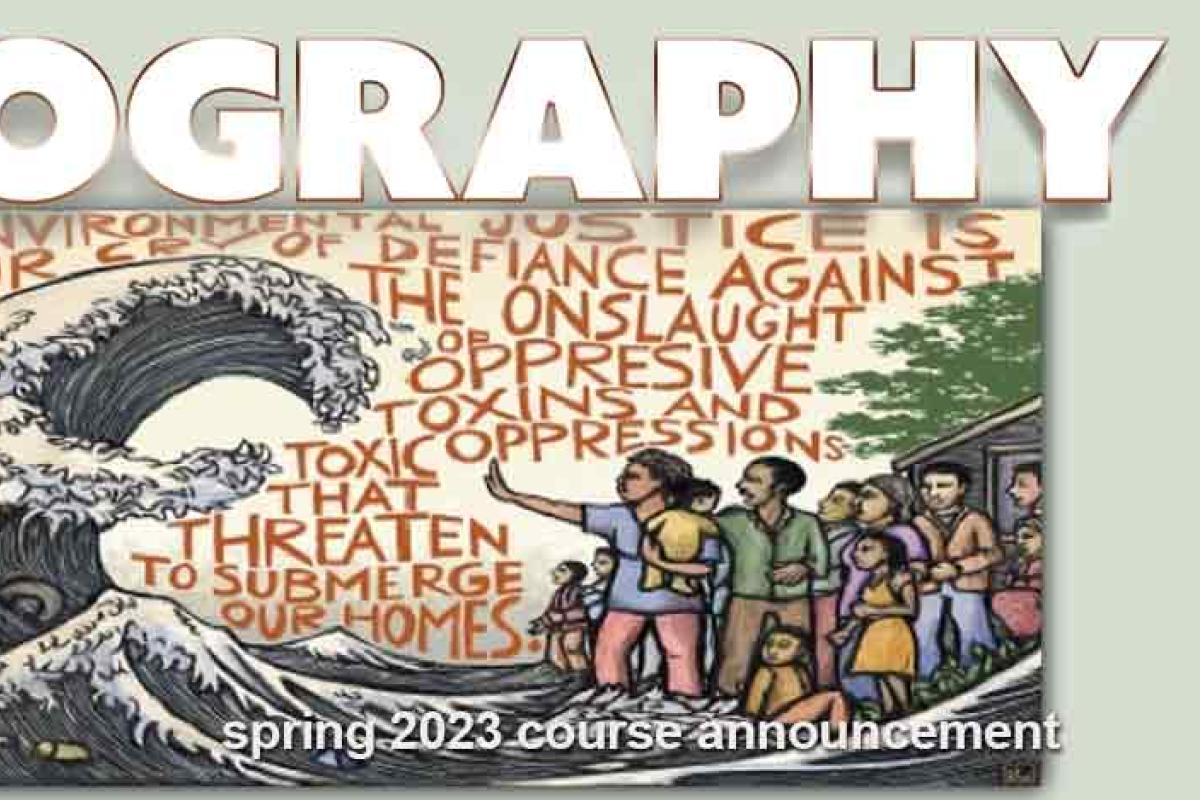
GEOG 3782
Environmentalism, Race, and Justice
Jill Harrison
As the environmental justice (EJ) movement has emphasized, environmental problems do not affect all people equally. EJ activists and EJ scholars have demonstrated that communities of color, Indigenous communities, and working-class communities are disproportionately exposed to environmental hazards and are disproportionately vulnerable to the effects of exposure to those hazards - inequalities that cause illness, death, suffering, cultural dislocation, and other egregious forms of injustice. The need for socially just environmental action is more urgent than ever before.
This course examines spatial inequalities in environmental problems and their relationships to environmentalism and racism. In the course, we will describe patterns of environmental inequality at various scales (local, national, international) and examine their implications for human health, well-being, and sense of place. We will identify key causes of environmental inequalities, paying particular attention to environmentalism and racism. The course explores efforts to reduce environmental inequality, including by social movements, researchers, students, journalists, political leaders, and government agencies, and it introduces students to research methods for documenting and analyzing environmental inequality. The course will focus geographically on the United States.
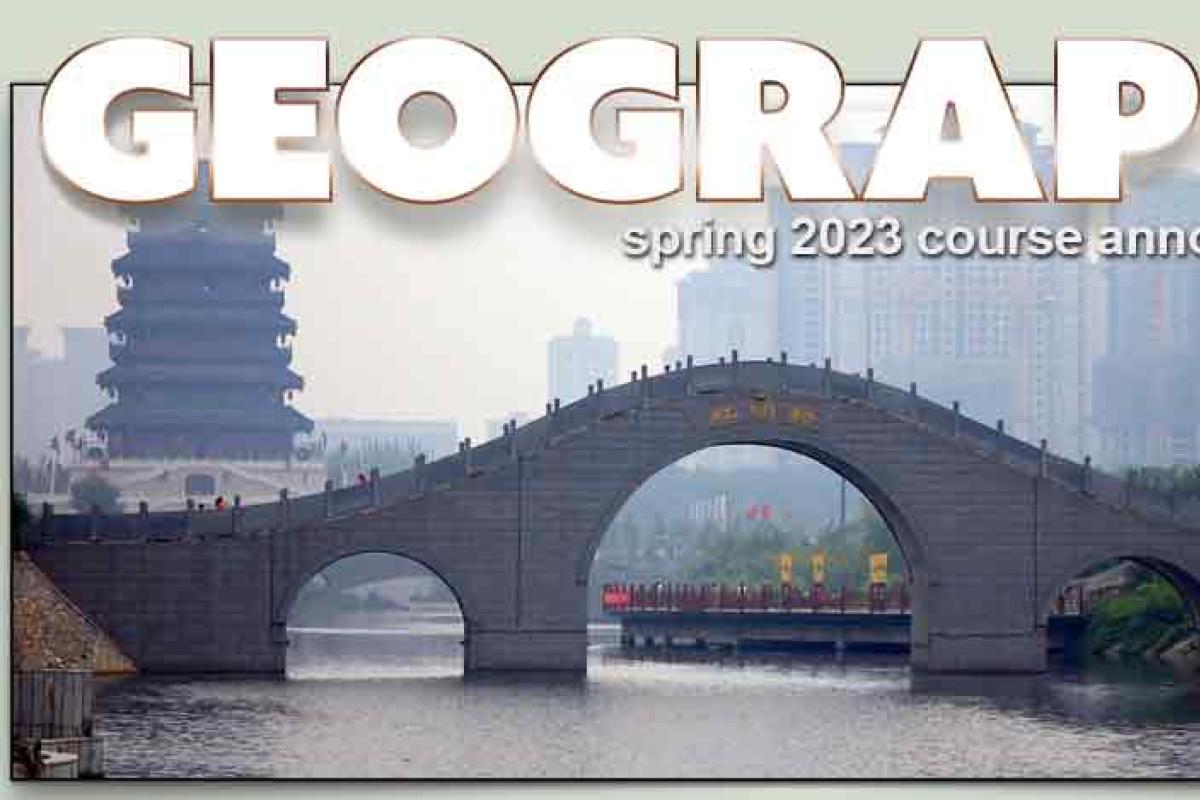
GEOG 3822 - 581* & 582*
Geography of China
Fan Li
China is one of the fastest changing countries on earth. With hundreds of new cities under construction, rapidly accumulating wealth among the middle and upper classes, a precarious environment and resource-base, and rising geopolitical ambitions, understanding a changing China is more important now than ever before. Yet as China’s influence grows, it seems to become more misunderstood than ever. This course aims to explore China’s changes, as well as dispel common myths about contemporary China, through the lens of human geography.
We explore China’s diverse environmental and cultural landscapes, its historical geography, and the challenges of rural development, urbanization, environment, energy, and climate change.
*Continuing Education (CE) Classes are Billed Separately. If you enroll in both Main Campus and CE classes in the same term, CE tuition will be billed in addition to your Main Campus tuition. This class is not COF eligible.
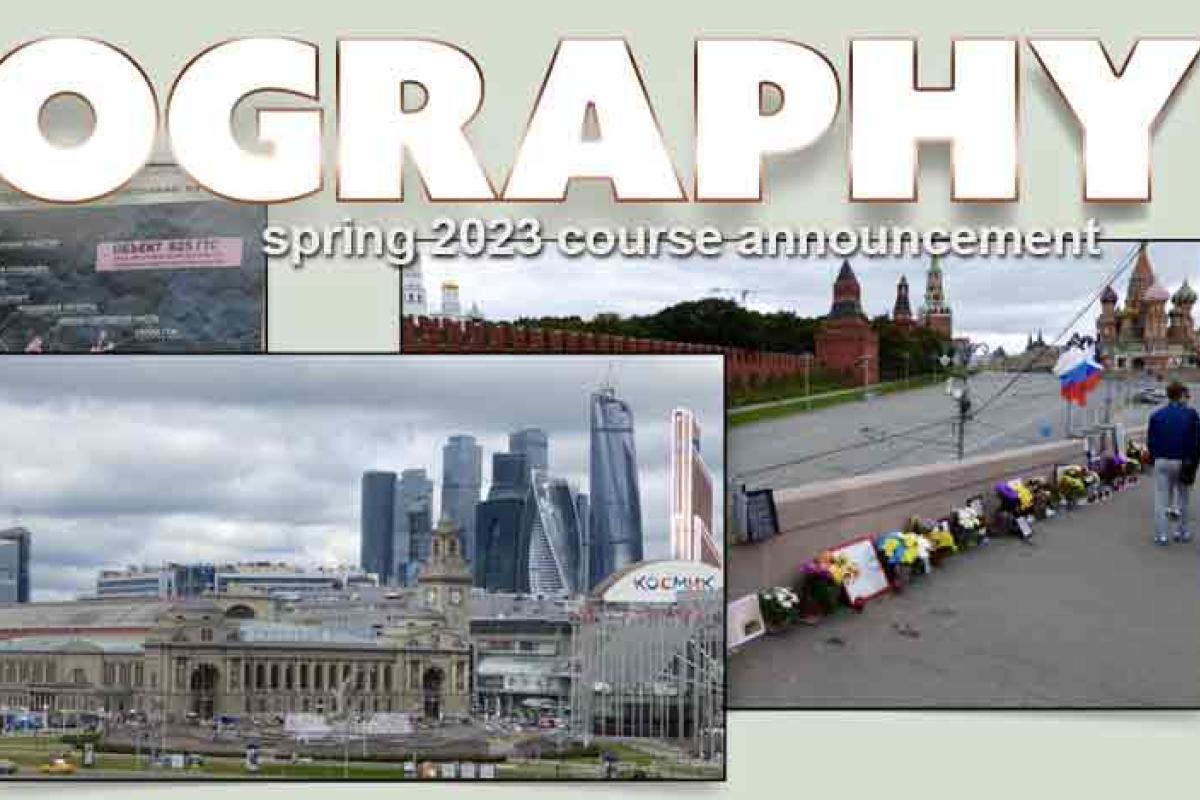
GEOG 3882
Geography of the Former Soviet Union
John O’Loughlin
Russia has been in the news a lot recently, with much attention to Vladimir Putin and his actions. The former Soviet Union is a hugely complex place and is changing rapidly in diverse ways.
The course goals are to give students the background to understand contemporary events. We will focus on post-Soviet and Russian geographies with special attention to political, social and environmental developments since 2014. Russian foreign policy and Russian interventions in the 'near abroad' (countries bordering Russia) especially the invasion of Ukraine will be examined as well as internal conflicts around religious identities, civil liberties, and environmental crimes.
Readings are a mix of a text, academic articles and current news analyses for an educated public. Students will write a term paper, and sit a midterm and a final exam. Class will be a mix of lecture and discussion of contemporary events.
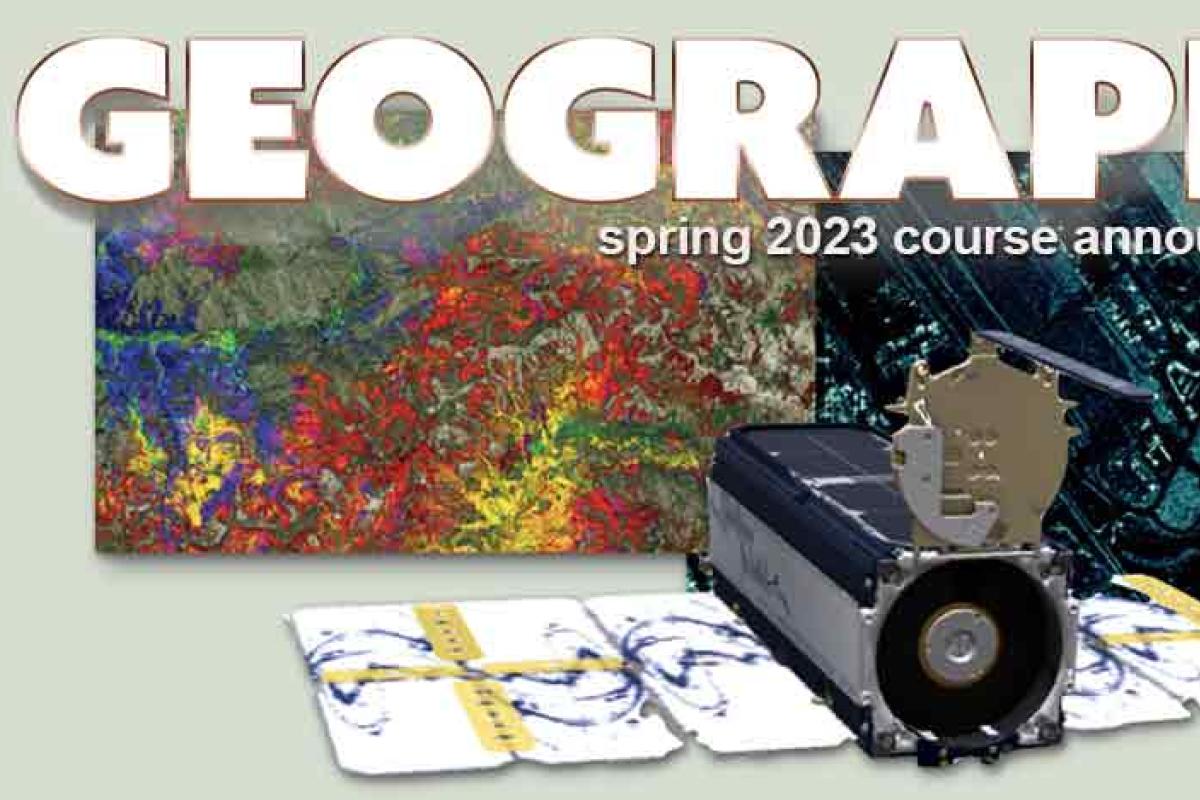
GEOG 4003
Topics in Geographic Skills – Advanced Remote Sensing
John Adler
The “Advanced Remote Sensing” course is a follow-on to the prerequisite class “Introduction to Remote Sensing” (GEOG/GEOL 4093/5093). Advances in cloud computing, cube satellites, and private space-based earth observation companies have pushed global data collection efforts from various new remote sensing platforms. This course will focus on advanced data analysis techniques from visible, hyperspectral, radar, and lidar systems via neural network algorithms & some traditional methodologies. Commercial and open-sourced software will be utilized to apply spatial and atmospheric corrections to imagery, and by aggregating datasets, we will extract the maximum amount of useful information. Students will be able to apply these advanced techniques to environmental issues that challenge our global community.
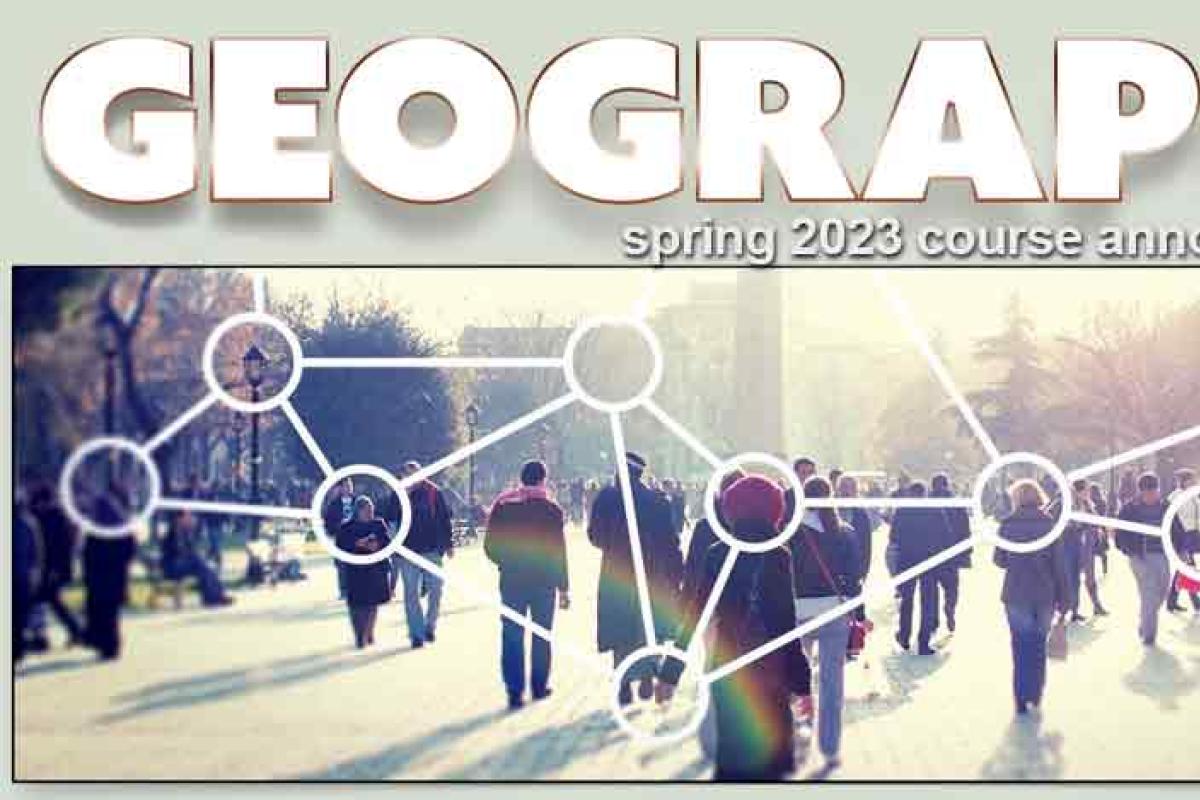
GEOG 4023/5023
Advanced Quantitative Methods for Spatial Data
Guofeng Cao
Methods and models for analyzing spatial data are new and in many cases, quite complex. The special nature of spatial data means that geospatial researchers need to develop tools and methods that are specific to spatial data, but that are easy to combine with other forms of analysis. This course covers a number of techniques aimed at the analysis and understanding of spatial data. We will cover statistical methods that are commonly used in geography including hypothesis tests, linear and non-linear regression, spatial and temporal autocorrelation, spatial modeling, geographically weighted regression, spatial lag and spatial error models, and other geocomputational methods.
Students will receive exposure to the latest issues, statistical approaches, and application perspectives. Lectures, classroom discussions, reading assignments, and lab exercises will provide students with hands-on training and problem-solving experience. The course will be of interest to students interested in the analysis of geospatial data from a variety of perspectives, including human and natural environments.
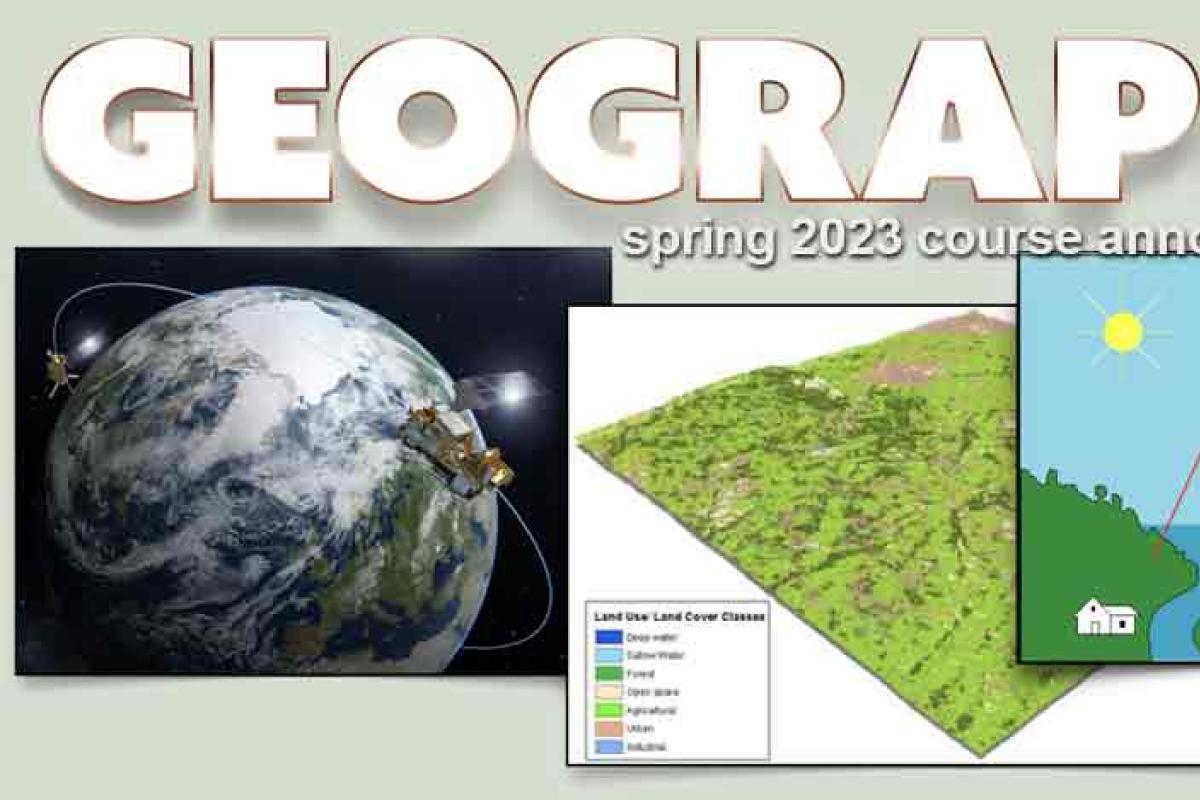
GEOG/GEOL 4093/5093
Remote Sensing of the Environment
Section 010: John Adler
Section 581*: Rachel Isaacs
Global environmental change is one of the most pressing international issues of this century. There is a need to monitor the earth's vital signs from atmospheric ozone to sea level change.
Satellite data sets are critical for monitoring regional and global changes, determine natural variability of Earth systems and addressing fundamental global change issues. The course is designed to introduce students to the techniques of remote sensing measurements of environmental parameters from aircraft and satellite platforms. The course is based on the application of simple physical principles of electromagnetic radiation. Different sensing systems such as electro-optical systems, passive microwave systems, ranging systems, and scattering techniques will be discussed with applications for the atmosphere, cryosphere, lithosphere, and biosphere.
*Continuing Education (CE) Classes are Billed Separately. If you enroll in both Main Campus and CE classes in the same term, CE tuition will be billed in addition to your Main Campus tuition. This class is not COF eligible.
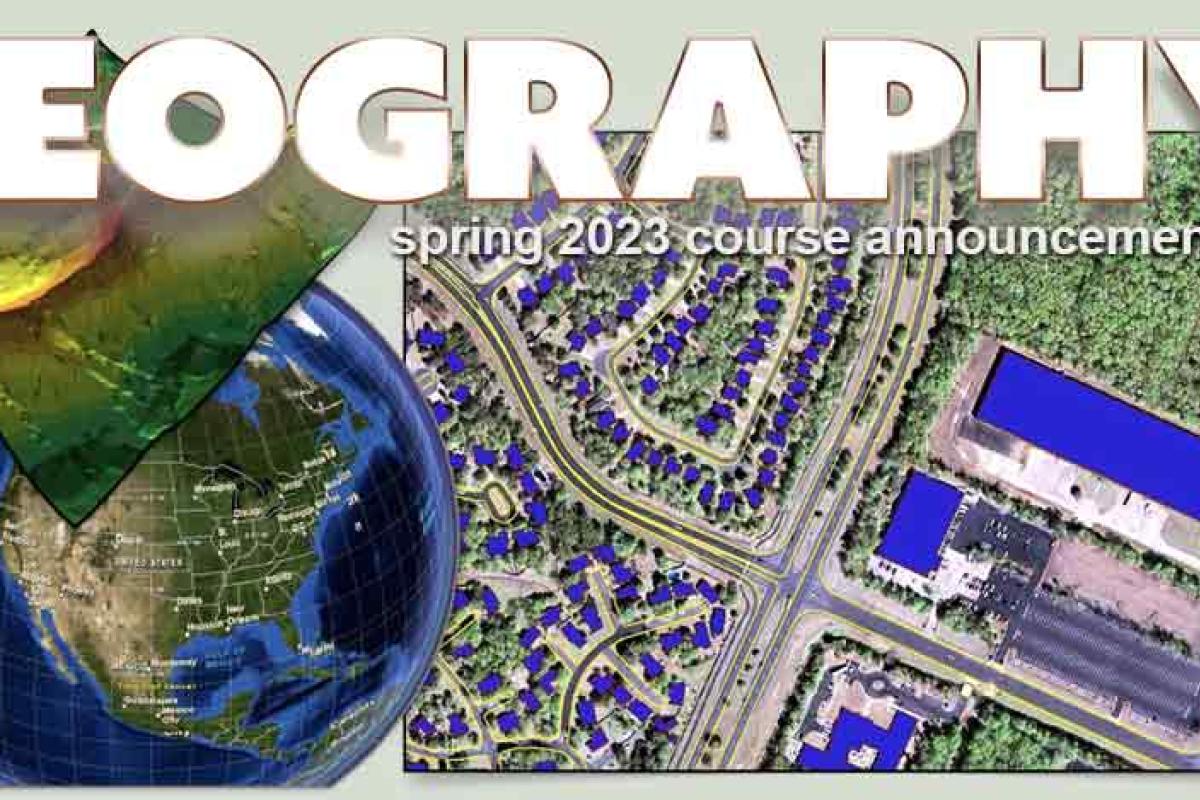
GEOG 4103/5103
Geographic Information Science: Spatial Analytics
Guofeng Cao
Are you ready to bring your GIS skills up to the next level? This course introduces the theoretical concepts and advanced use of Geographic Information Systems (GIS). It focuses on the nature of geographic information, the management of geospatial data and available methods for geographic analysis and geoprocessing to perform advanced and complex modeling in a GIS environment. Lectures focus on the theoretical basis of GIScience, the understanding of spatial algorithms and the development of a critical attitude toward GIS operations and model outputs. During lab sessions students will be able to apply the concepts and techniques presented in lectures and become well-trained in using GIS software. The aim of this course is that students understand elementary GIS theory, have a working knowledge of ArcGIS, and be able to develop GIS-based solutions for spatial problems, independently. In short: You will be ready for starting your professional GIS career.
Prerequisites:
- GEOG 3053 (GIS Mapping) or similar
- GEOG 3023 (Statistics and Geographic Data)
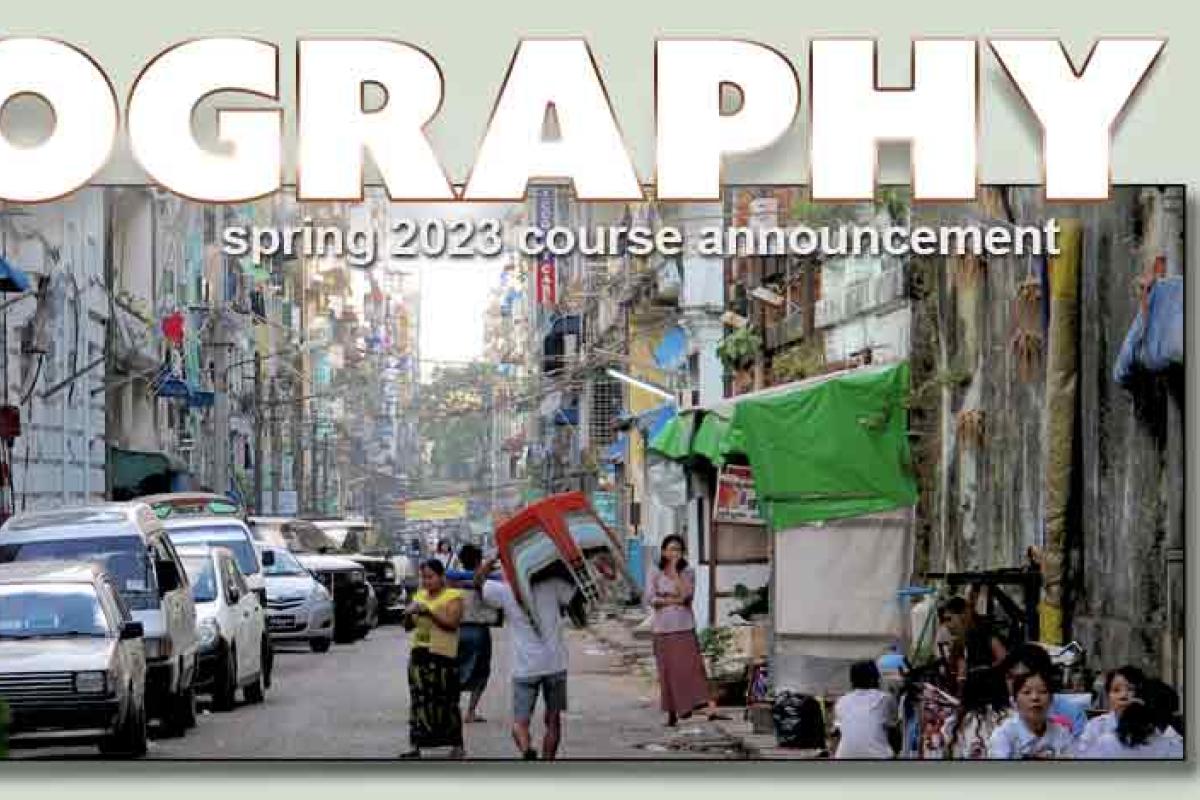
GEOG 4173
Research Seminar
Are you a Geography major or minor who is:
- Passionate about a question or topic you want to do true in-depth research on by doing fieldwork and/or collecting/ analyzing data others have collected?
- Further interested in learning more about the research and writing process, and which kinds of research make sense for which questions?
- Considering writing an Honors or Senior
Thesis and/or thinking about future graduate studies?
This hands-on seminar will introduce you to the craft of research and allow you to explore a question related to a variety of social or natural science subfields. We will give you the tools and guidance for you to explore the issues you find most interesting while giving you time to pursue them.
This course fulfills the Geography skills requirement and offers cruciai preparation for any student interested in graduate school.
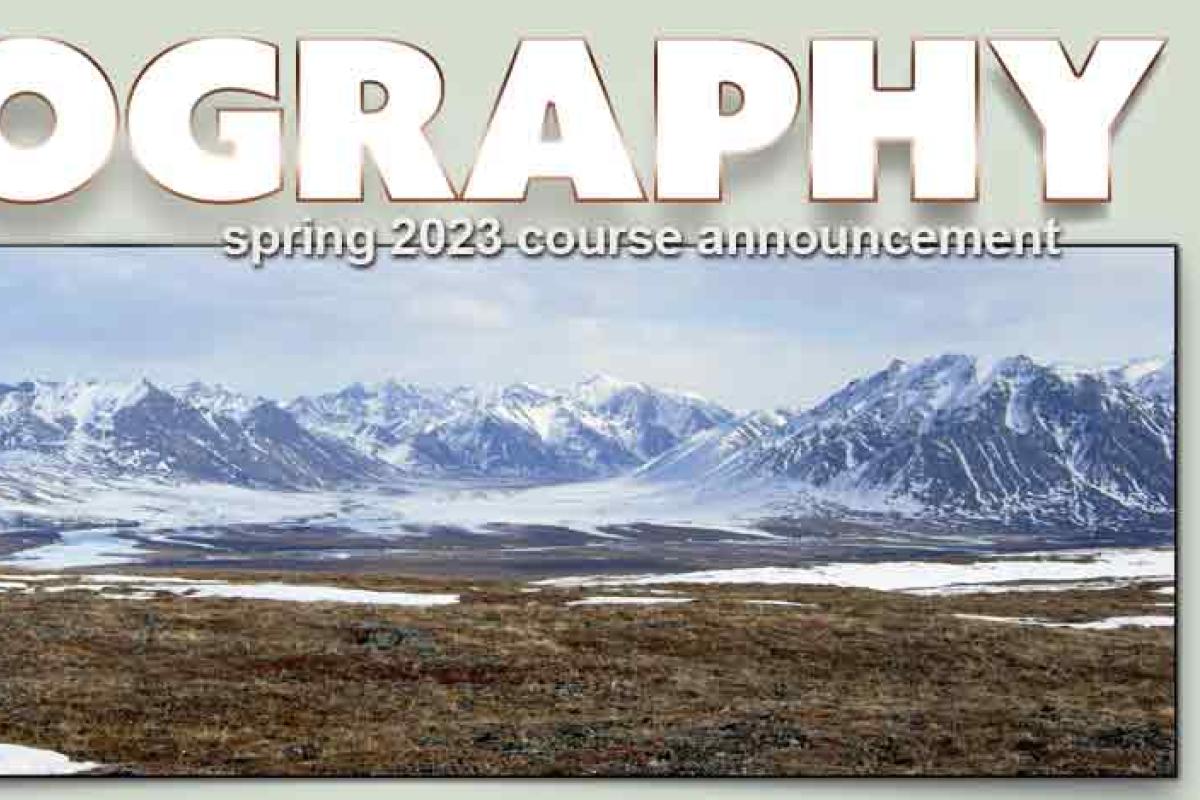
GEOG 4271/5271
The Arctic Climate System
Mark Serreze
The Arctic region plays a key role in regulating global climate and is in the midst of rapid change, with impacts on physical, biological and human systems both within and beyond the region.
This comprehensive assessment of the Arctic climate system begins with an overview of the Arctic's basic physical characteristics and climatic features.
Attention then turns to the atmospheric energy budget, the atmospheric circulation, the surface energy budget, the hydrologic cycle, and the fascinating interactions between the atmosphere, Arctic Ocean and its sea ice cover. Following an overview of numerical modeling of the Arctic system, we explore Arctic climate history over the past two million years. The final segment of the course explores the future of Arctic climate and potential impacts on society, including issues such as increased access to oil, gas and mineral wealth at the bottom of the ocean, commercial shipping and conflict between stakeholders.
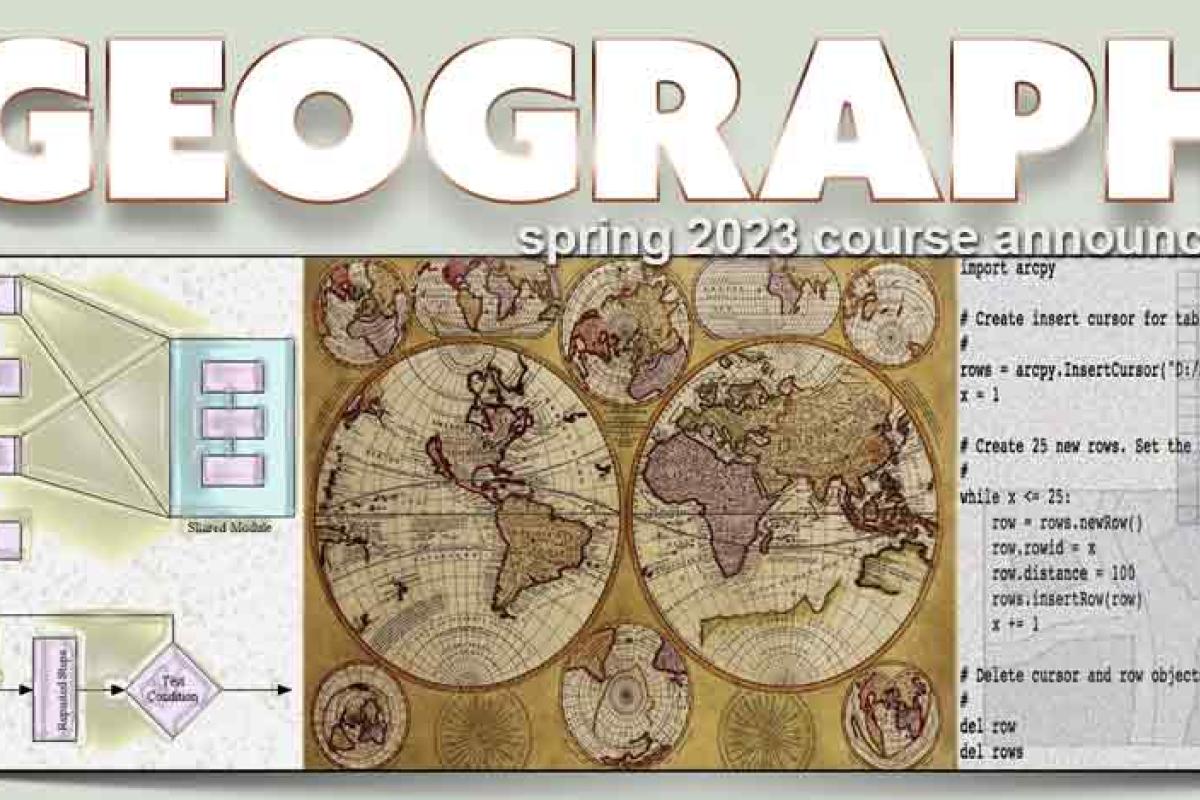
GEOG 4303/5303
Geographic Information Science: Spatial Programming
Philip White
Do you want to enter the job market as a competitive GIS modeler with programming skills? This course will help you get there. It focuses on the extension of geographic information systems (GIS) through programming as well as on the development of algorithms for spatial analysis and information extraction in vector and raster data. We will cover different concepts, principles and techniques of programming that help you to solve a variety of spatial problems in physical and human Geography. You will learn how to work with Python for Geoprocessing in ArcGIS as well as for spatial programming in gridded data using numpy, scipy and other open source libraries. Furthermore, you will understand the basic ideas of object-oriented and procedural programming. You will develop skills to explore, handle, manipulate, and model spatial data as well as methods development. Lectures will include numerous demonstrations and hands-on examples as well as algorithmic exercises. In labs you will work on solving typical programming and implementation problems that you will encounter in the real world. During the last weeks of the term students will work in small groups on a proposed project to deepen their programming knowledge, improve their GIS proficiency and train their presentation and communication skills.
Prerequisites: 1) GEOG 4103/5103 or comparable is required. 2) Working experience with ArcGIS 10x. 3) Additional coursework such as GEOG 4203/5203 would be helpful. 4) Programming experience is not a prerequisite.
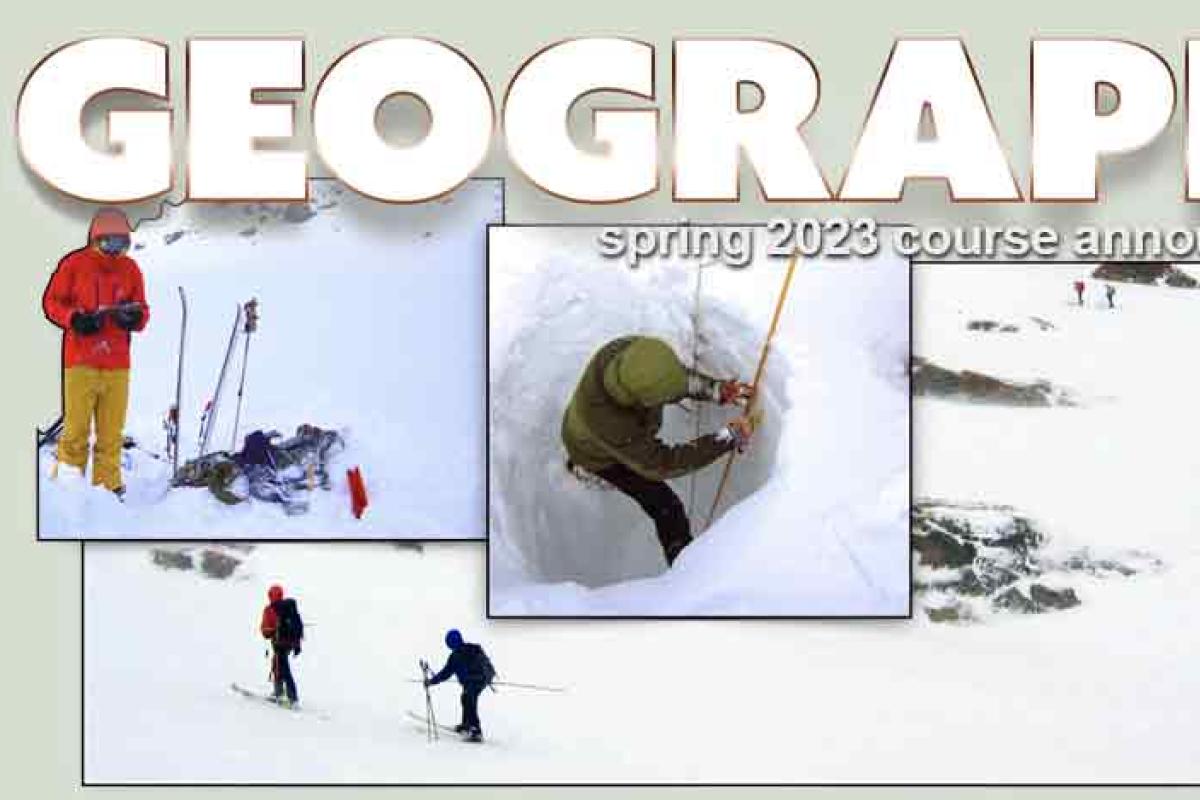
GEOG 4321/5321
Snow Hydrology
Noah Molotch
Are you interested in the various processes related to snow in mid-latitude and polar areas? You will learn the physics and chemistry that underlie processes such as snow metamorphism, and apply this knowledge to real situations, including calculation of basin storage of water, runoff rates, acid snow, and avalanche dynamics.
The course will cover snow formation in the atmosphere, snow accumulation and distribution, snow metamorphism, avalanche dynamics, snowmelt and runoff, remote sensing of snow properties, and case studies in the Rockies and Sierra Nevada.
Prerequisites are a physical geography course or equivalent, and a parametric statistics course.
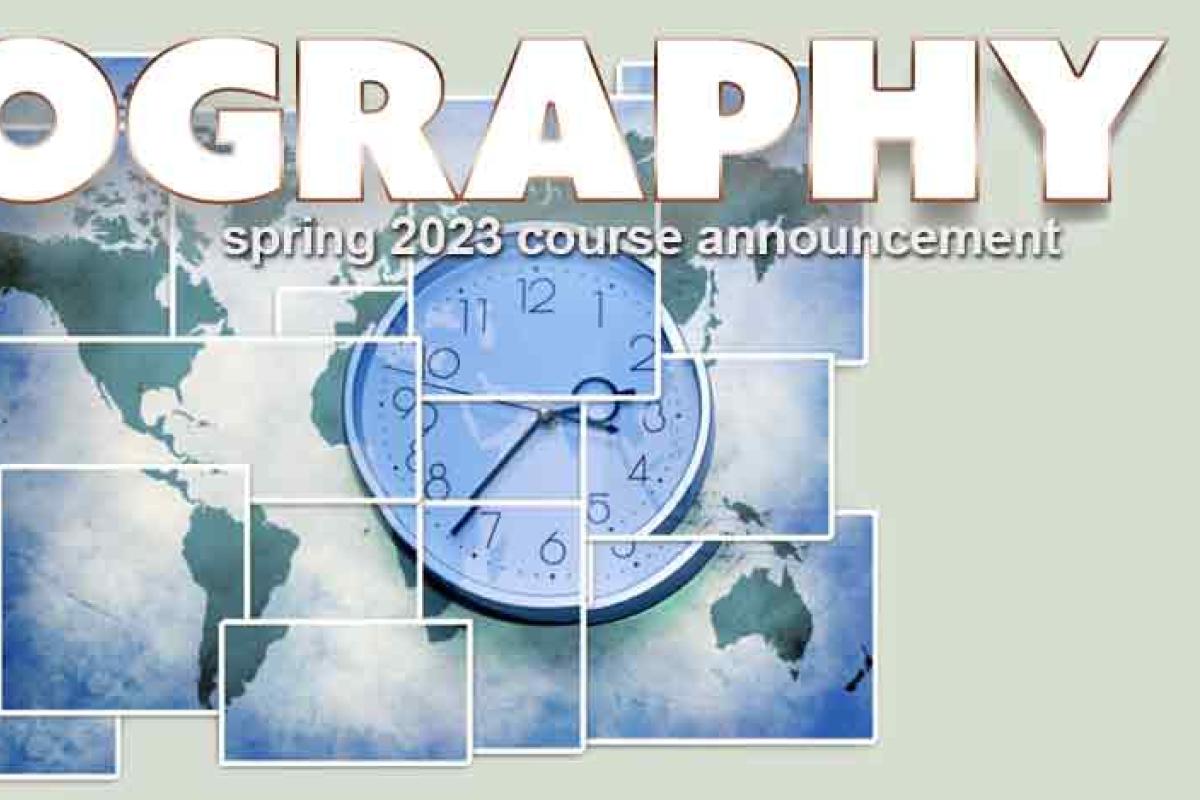
GEOG 4403/5403
Space Time Analytics
Guofeng Cao
We live in a dynamic and ever-changing world. Knowledge of the tools, techniques, and theories behind spatio-temporal data and analysis is therefore essential to understanding the dynamics of most systems on the planet. In this course, we focus on understanding processes (be they human, natural, social, or physical) through data-driven analysis and modeling of patterns in spatio-temporal data. This course is designed to introduce you to a wide range of topics and ideas around observing, modeling, and understanding dynamic systems in Geography, Environmental Science, Climate Science and related fields. As such, we will cover a wide range of topics, including spatio-temporal data, machine-learning, modeling, visualization, time-geography, and various contemporary issues/new directions in spatio-temporal analytics.
This is an advanced course in quantitative and theoretical methods for spatio-temporal analysis. As such, some background in R or Python is highly recommended (though not required).
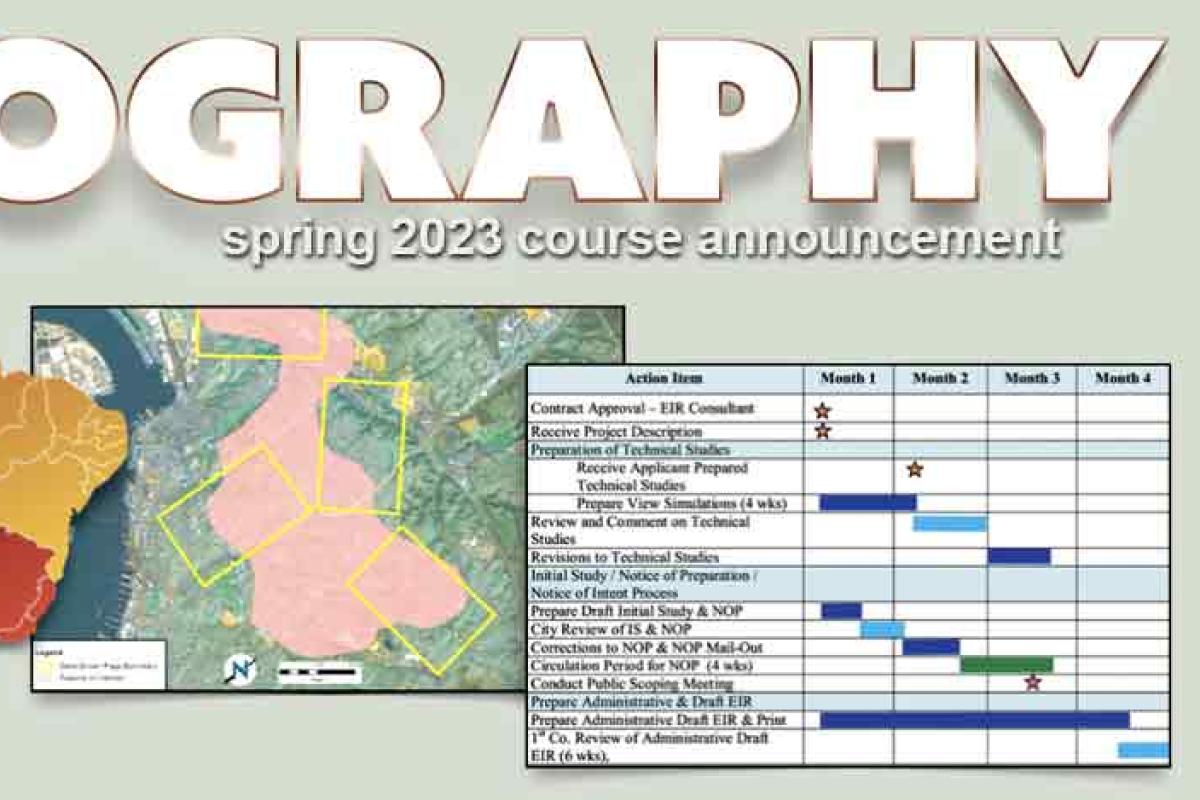
GEOG 4503/5503
Geographic Information Science: Project Management
Sarah Kelly
Have you taken Cartography or GIS and want to tackle a real project with real data? Are you looking to complete an Honor’s or Master’s thesis which has a mapping/GIS component? Maybe you’re thinking about going out into industry or nonprofit work after you graduate, and want to have a better grasp on how to manage a project from the ground up? Then this class is for you!
You will gain confidence in project planning and scoping, obtaining data, creating a realistic timeline and budget, understanding team dynamics and how it impacts your project’s success, evaluating project progress, and solving issues that will inevitably arise. The class offers an opportunity to work through a project from start to finish, with help and guidance on technical aspects, conceptual approaches, and on effectively communicating results.
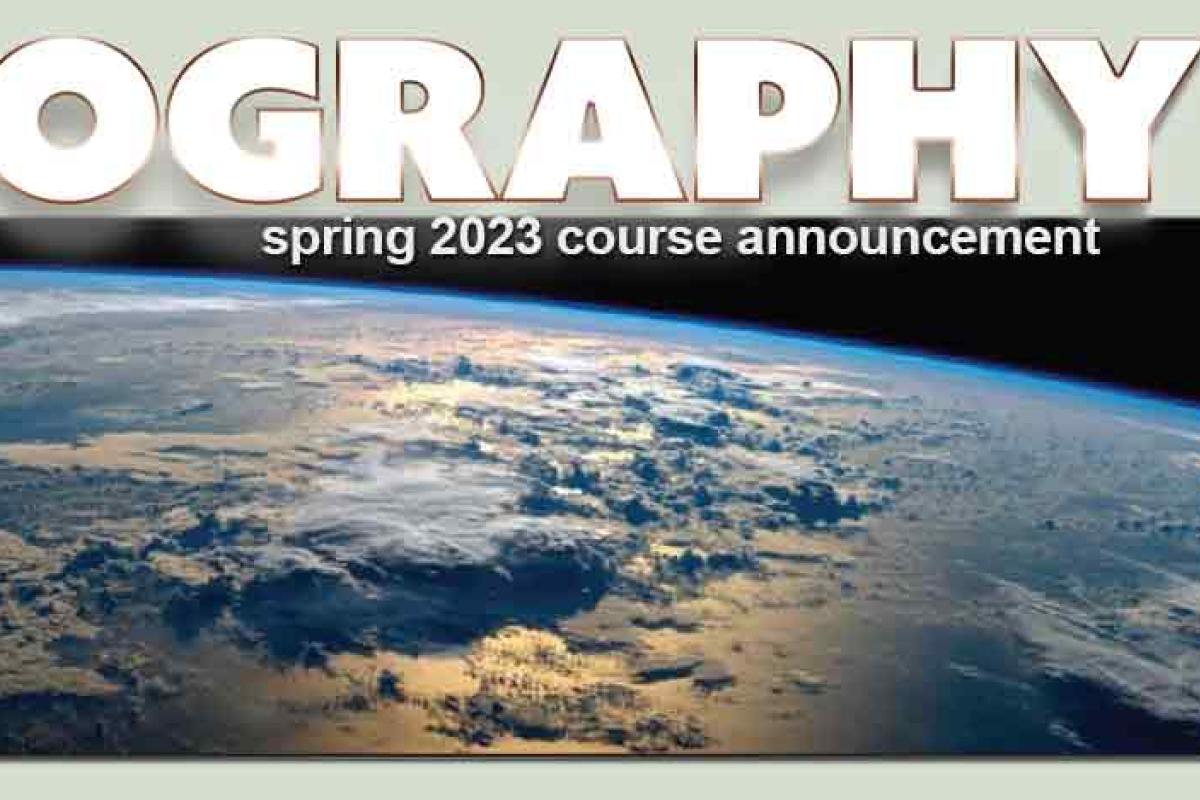
GEOG 4563/5563
Earth Analytics
Elsa Culler
This multidisciplinary course will address major questions in Earth science and teach students to use the analytical tools necessary to undertake exploration of heterogeneous 'big scientific data.' This course is designed for upper level (junior / senior level)
undergraduate students and graduate students.
Throughout the course you will use computationally intensive techniques to address scientific questions. You will use a suite of different types of publicly available data including:
- Satellite and airborne lidar and spectral remote sensing data.
- Data collected using distributed in situ (on the ground) sensor networks.
- Social media data.
This course is technical. You will use the Python scientific programming environment and the Jupyter Notebook interface to work with data. You will code every week!
This course is developed by Earth Lab. Earth Lab harmonizes the wave of Earth observations from aerospace platforms to address scientific challenges in understanding the pace and pattern of global change.

